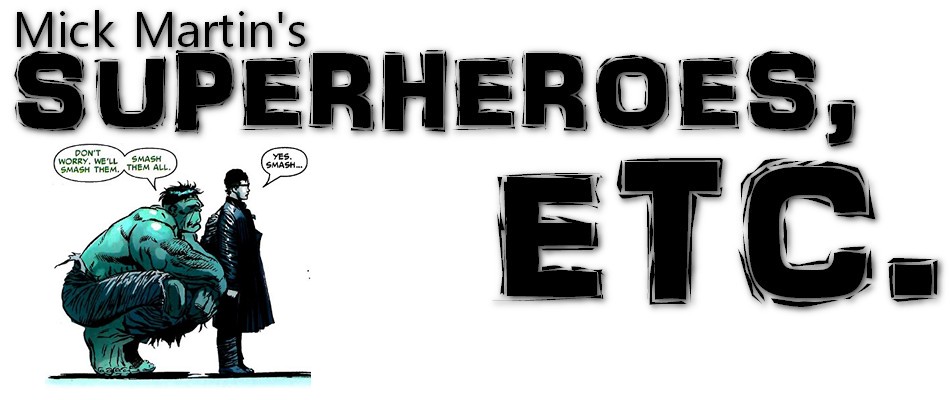The lack of activity at Superheroes, etc. does not mean I've again given up blogging, but that I'm just really damn busy.
This is my senior year. Last year, I successfully applied to my school English Honors program specifically for the chance to write an undergraduate thesis while being closely advised by a professor. When I first heard of the program, I didn't consider it to be very valuable, particularly since I have no immediate ambitions for grad school. I haven't completely dismissed grad school as a possibility, but if I ever do apply, it will be at least a few years after I graduate, maybe even when I can make enough money that working towards a Master and/or Doctorate wouldn't dig me even deeper into debt.
The idea of writing a thesis itself is what eventually turned me on to the Honors program. As a writer, the idea of having a professor as a captive audience seemed too valuable to pass up, and - unless I ever go to grad school - it will be the only such opportunity I ever get.
I originally planned to write something very critical and very smart and probably very incoherent about superheroes, but when I was accepted into the program I learned that the department was offering a relatively new option: the creative thesis.
For about a year and a half, the creative thesis is what I've been waiting for. It made the "captive professor" opportunity that much more attractive. Unfortunately, the fact that the creative thesis option is relatively new made me a victim of a harsh wake-up call last week when I finally got to talk to my adviser about the project.
The problem with the creative thesis option, you see, is that no one seems to have any fucking clue what the fuck a creative thesis is. It involves creative writing, and it has a "critical component," and that's about as far as most professors go when you ask them about it. To my adviser, a creative thesis meant experimenting specifically with the form of the medium in which you're working. Me? I just wanted to write a story. I didn't want to experiment with the form. The story I wanted to write complicated things, because I wanted to write a prose novella about superheroes, which complicates questions of genre and medium. Plus, while my adviser is pretty much THE person to go to in the department about superheroes and graphic novels, but she's not a creative writer. Finally, I'm a transfer student, haven't had the chance to take many creative writing classes, so if I chose to switch advisers I wouldn't know who the hell to go to. I've had three creative writing classes since attending my current school. The instructor of the first two were adjuncts, and the adviser has to be a full professor. The instructor of the third would make a great adviser, but she's going on sabbatical in the Spring. And while I could always seek out other creative writng professors, considering the usual tastes of English academia, I don't think many would respond with "Oooo!!!! Superheroes! Pick me! Pick me!"
So, I switched to a critical thesis, about, yes, superheroes. The good news is that because of the nebulous "critical component" of the creative thesis, I'd already done a lot of research. The only thing I'm in a big rush to do right now is narrow in on my topic. Last night, I e-mailed my adviser with three brief, convoluted project ideas: The Hulk (I could expand, but I want to sleep), Superhero comics Post-9/11, and the superhero in relation to the Übermensch. Right now, I'm leaning towards Übermensch. Yesterday, I was leaning towards the Hulk. Before that, Post-9/11. Tomorrow, I'll probably be back to Hulk. After that, I may consider switching my major to Hotel Management.
I briefly considered discarding superheroes and doing something about Lone Wolf and Cub, but I've got a backlog of superhero research from other classes, as well as from the first month of this semester, so I'd rather utilize that than derail myself.
The fact that I e-mailed my adviser with those ideas is the only reason I'm giving myself this brief time to blog, because I've decided that until I hear back from her, I'm in a research holding pattern. I need to narrow my scope before I go any further. I have a 5-minute presentation due Tuesday about my progress, and I'd like to be able to say something other than "It's about superguys!" I don't want to read yet another article about "Superman as Christ" or "The Postmodern Narrative of Marvel Comics" until I have a better idea about whether or not it's relevant to my thesis.
So, yeah, that's why I haven't been blogging. It's ironic because on the face of things, I should be more relaxed than in previous semesters. I only have 3 classes. All three are one-day, three hour classes, and the two non-thesis-related courses are pretty low stress (in one, Digital Media Workshop, all we've done so far is learn things about html and photoshop that I've already learned by blogging). I just want to make things as easy for myself next semester (when I actually have to write the thesis) as I can. I've probably read more in the first month of this semester than the entirety of most semesters. I learned about the magic of Interlibrary Loan at the end of last term, and at this point I'm sure whoever is in charge of it at my school's library has a picture of me on their dartboard.
So yeah, that's why I haven't been blogging lately. Mick Busy. Until the thesis ends, blogging will be sporadic.
Though, I have been trying to keep up on my funnybook reading, and along those lines...
(SPOILER ALERT, though you probably know it already)
...MARK! Good job with Civil War #4. If there's one thing that's been bugging me lately, it's the throng of African American superheroes choking the respective cooperative universes of Marvel and DC. The fact that the guy was nothing but a distant memory from the 70's until Civil War promos were plastered all over the Net wasn't a big hint either. Thank God you did it before his updated costume and the wise choice of lopping the word "Black" off the front of his name threatened to make him yet another addition to the incalcuable horde of African American superheroes whose solo titles dominate the marketplace.
(Dude, seriously, I knew you needed to kill someone, but - and I say this as a diehard Defenders fan - couldn't you have killed Nighthawk instead? Kill a rich, white guy every once in a while. It'll make you feel good. It worked for the French.)
Saturday, September 30, 2006
Tuesday, August 22, 2006
Cosmic Crisis (or, The Gods Must Hump Like Crazy)
Anyone who has the sometimes frustrating habit of surfing through Marvel fan message boards will be familiar with the debate – that has received more attention since the beginning of Infinite Crisis – of whether or not Marvel should have its own Crisis event to clean up continuity issues. I’ve never liked the idea, mainly because I didn’t like Crisis on Infinite Earths and consequently haven’t seen one panel of its recent sequel. I don’t know enough about DC continuity to figure out why anyone ever considered either to be necessary, and that’s part of the problem. I have difficulty figuring out the logic behind trying to rejuvenate a mythology – presumably in order to, among other things, draw in new readers – by publishing a massive storyline that only those with a relatively comprehensive knowledge of the history will be able to understand. Of course, the main reason I’d never want to see something like this with Marvel is because it would necessitate the kind of big, dumb crossover we just saw from DC.
As much as I disagree with the idea of a Marvel-wide Crisis, I can’t help but wonder if a specific section of the mythology couldn’t use a little Superboy-meets-wall treatment: namely, Marvel’s cosmic characters.
And that may seem like a stupid thing to say considering that Annihilation, perhaps Marvel’s biggest cosmic event since the days of Starlin’s various Infinity series (or, to be more precise, since the days that Starlin’s Infinity series had any impact on the rest of the MU) is already in full-swing. After reading all the Annihilation books published so far, however, it seems to me that the event is further proof that the problem exists rather than a solution to it.
I was expecting both more and less from Annihilation. By "less," I mean that I wasn’t expecting to enjoy it as much as I have. Annihilation: Nova is certainly the most impressive of the prequel books, and I would be either genuinely surprised or unsurprisingly disappointed if the event doesn’t lead to an ongoing monthly for the character (hopefully with the same creative team as Annihilation: Nova). As Joel Hunt says over at Sleep is for Suckers: "Yes, Nova is basically Peter Parker in the Green Lantern Corps…but damnit, that’s not a bad concept to hang a character on." Annihilation: Silver Surfer doesn’t seem that much different or more interesting than the character’s previous series, but Renato Arlem’s art more than makes up for it. Annihilation: Super-Skrull is fun though not particularly memorable, and Annihilation: Ronan is the worst of the bunch, managing – in only four issues – to be as confusing as any dense crossover from either of the Big Two. Utilizing the Seven Soldiers model served the Annihilation prequels well, giving this cosmic war the kind of grandness such a story deserves, whereas in previous eras something like this would probably have been breezed through in one or two issues of Silver Surfer or Fantastic Four.
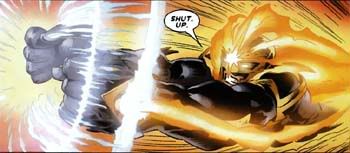
But, by saying I was expecting more, I meant that I was expecting something appreciably different about the particular characters and Marvel’s cosmic canvas as a whole. I was expecting some kind of redefinition of the thing. On that front, Annihilation simply hasn’t delivered. The only significant difference I can see is that villains like Drax, Super-Skrull, and Ronan are being treated as protagonists; and heroes like Nova and Silver Surfer have become much darker and, specifically, much more willing to kill. We’re not exactly going where no comic book has dared to go before.
I started to tune into exactly what it was that bothered me about Marvel’s cosmic stories while reading Annihilation: Silver Surfer, as two new characters – Tenebrous and Aegis – were introduced. The two are old enemies of Galactus and are freed during the attack of the Annihilation Wave. After a bit of reflection, I realized that my issue with Marvel’s cosmic stories is the same problem the Christians had with the pagans.
TOO. MANY. FUCKING. GODS.
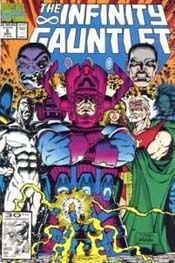 I’ve never followed the cosmic books as much as the kind of fans who can draw up charts to show how the Living Tribunal can bitch-slap Eternity or vice-versa. Still, ask me to name as many cosmic characters I can off the top of my head, and most of them will be the kind of Beyonder-level characters who seem to be able to do just about anything. It seems like there are more omnipotent-y characters in Marvel’s cosmos than just your average super-guys. The gods are legion in space, there’s too many to name, and no matter how indefinable and powerful they are, all of them seem to manifest their powers in the same way: as ‘splody laser beams shooting of their hands and/or eyes.
I’ve never followed the cosmic books as much as the kind of fans who can draw up charts to show how the Living Tribunal can bitch-slap Eternity or vice-versa. Still, ask me to name as many cosmic characters I can off the top of my head, and most of them will be the kind of Beyonder-level characters who seem to be able to do just about anything. It seems like there are more omnipotent-y characters in Marvel’s cosmos than just your average super-guys. The gods are legion in space, there’s too many to name, and no matter how indefinable and powerful they are, all of them seem to manifest their powers in the same way: as ‘splody laser beams shooting of their hands and/or eyes.
I think the relative lack of cosmic stories in recent years has made the problem worse. I imagine that when Silver Surfer was coming out every month, the writers knew they couldn’t just spit out a new uber-god each issue. Now, with the rarity of cosmic stories, it seems like the writers feel that they need to create a new I-can-eat-your-planet-and-fart-a-solar-system character in order to make the thing feel as BIG as possible. In fact, I can’t think of one post-2000 cosmic story that didn’t introduce such a character. There’s the aforementioned duo in Annihilation: Silver Surfer, Stormbreaker: The Saga of Beta Ray Bill had some uber space demon as well as some invisible god guys who resurrected Bill for no discernible reason, Infinity Abyss featured some freaky Thanos clones and one of them – if I remember correctly – was a mix between Thanos and Galactus, Entropy from the first story arc of Captain Marvel’s final volume, and then there was that Pharaoh dude from Marvel Universe: The End. Being all-powerful is as commonplace in Marvel’s cosmos as having superpowers is in Top Ten.
(SPOILER WARNING: I’m about to reveal a significant Annihilation plot point.)
And just like wearing a cape means less than nothing in Neopolis, being a god in Marvel’s cosmos doesn’t mean a damn thing, and the proof is in the stories. The first issue of Annihilation ends with what may be the death of Galactus. Probably not, but if he is in fact dead, who cares? How many times has he died at this point? Yeah, you could say the same thing about most Marvel characters, but most Marvel characters don’t eat fucking planets. The integrity of a character like Galactus depends on his NOT being killed every other time he shows up. Likewise, in spite of the rarity of cosmic stories these days, I can think of exactly two 21st century appearances of Eternity, and in both cases (Captain Marvel and the Giffen/DeMatteis Defenders mini) he was killed.
None of this is to say that Marvel’s cosmos shouldn’t have a rich pantheon of gods in sci-fi clothing. But it seems to me that the pantheon is overcrowded and, worse, the idea of a godlike character is being diminished by overuse. A while back I wrote a post about how the various Star Trek series ran into creative dead-ends and constantly fell back on time travel as a plot device. Marvel’s cosmic stories suffer from something similar. Just about every cosmic story has something to do with a new god rising and trying to kill an old god, and no matter who wins – since no one stays dead in comics – the result is too many fucking planet-eaters. Marvel’s cosmos should have its gods, but being a god should mean something.
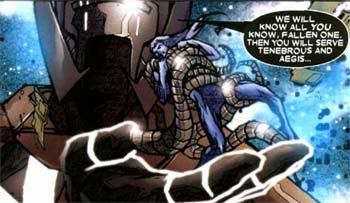
This is why I think, while I’m loathe see it happen all across the MU, a Crisis-esque wiping of the cosmic characters might be just what the doctor ordered. Thin out the gods, re-establish some of them, and make them feel like gods in more than name. If not through some kind of reality-altering story, then just have some mean motherfucker slaughter all but a few (of course, a lot of characters are getting whacked in Annihilation, but mainly heroes and villains, not the the big guys). Using another Star Trek analogy, Q wouldn’t have been as beloved a character if he showed up in every episode, or if every other villain was just as powerful. Likewise, Marvel should use its space gods sparingly. And when the writers do bring in Galactus or Eternity or some other big god guy, it shouldn’t be just to slaughter them. If the focus came off the space gods, maybe it would give the "House of Ideas" more time to develop new heroes (or re-establish old ones) in order to give the cosmic fans an ongoing monthly or two rather than your occasional mini-series.
As much as I disagree with the idea of a Marvel-wide Crisis, I can’t help but wonder if a specific section of the mythology couldn’t use a little Superboy-meets-wall treatment: namely, Marvel’s cosmic characters.
And that may seem like a stupid thing to say considering that Annihilation, perhaps Marvel’s biggest cosmic event since the days of Starlin’s various Infinity series (or, to be more precise, since the days that Starlin’s Infinity series had any impact on the rest of the MU) is already in full-swing. After reading all the Annihilation books published so far, however, it seems to me that the event is further proof that the problem exists rather than a solution to it.
I was expecting both more and less from Annihilation. By "less," I mean that I wasn’t expecting to enjoy it as much as I have. Annihilation: Nova is certainly the most impressive of the prequel books, and I would be either genuinely surprised or unsurprisingly disappointed if the event doesn’t lead to an ongoing monthly for the character (hopefully with the same creative team as Annihilation: Nova). As Joel Hunt says over at Sleep is for Suckers: "Yes, Nova is basically Peter Parker in the Green Lantern Corps…but damnit, that’s not a bad concept to hang a character on." Annihilation: Silver Surfer doesn’t seem that much different or more interesting than the character’s previous series, but Renato Arlem’s art more than makes up for it. Annihilation: Super-Skrull is fun though not particularly memorable, and Annihilation: Ronan is the worst of the bunch, managing – in only four issues – to be as confusing as any dense crossover from either of the Big Two. Utilizing the Seven Soldiers model served the Annihilation prequels well, giving this cosmic war the kind of grandness such a story deserves, whereas in previous eras something like this would probably have been breezed through in one or two issues of Silver Surfer or Fantastic Four.

But, by saying I was expecting more, I meant that I was expecting something appreciably different about the particular characters and Marvel’s cosmic canvas as a whole. I was expecting some kind of redefinition of the thing. On that front, Annihilation simply hasn’t delivered. The only significant difference I can see is that villains like Drax, Super-Skrull, and Ronan are being treated as protagonists; and heroes like Nova and Silver Surfer have become much darker and, specifically, much more willing to kill. We’re not exactly going where no comic book has dared to go before.
I started to tune into exactly what it was that bothered me about Marvel’s cosmic stories while reading Annihilation: Silver Surfer, as two new characters – Tenebrous and Aegis – were introduced. The two are old enemies of Galactus and are freed during the attack of the Annihilation Wave. After a bit of reflection, I realized that my issue with Marvel’s cosmic stories is the same problem the Christians had with the pagans.
TOO. MANY. FUCKING. GODS.
 I’ve never followed the cosmic books as much as the kind of fans who can draw up charts to show how the Living Tribunal can bitch-slap Eternity or vice-versa. Still, ask me to name as many cosmic characters I can off the top of my head, and most of them will be the kind of Beyonder-level characters who seem to be able to do just about anything. It seems like there are more omnipotent-y characters in Marvel’s cosmos than just your average super-guys. The gods are legion in space, there’s too many to name, and no matter how indefinable and powerful they are, all of them seem to manifest their powers in the same way: as ‘splody laser beams shooting of their hands and/or eyes.
I’ve never followed the cosmic books as much as the kind of fans who can draw up charts to show how the Living Tribunal can bitch-slap Eternity or vice-versa. Still, ask me to name as many cosmic characters I can off the top of my head, and most of them will be the kind of Beyonder-level characters who seem to be able to do just about anything. It seems like there are more omnipotent-y characters in Marvel’s cosmos than just your average super-guys. The gods are legion in space, there’s too many to name, and no matter how indefinable and powerful they are, all of them seem to manifest their powers in the same way: as ‘splody laser beams shooting of their hands and/or eyes. I think the relative lack of cosmic stories in recent years has made the problem worse. I imagine that when Silver Surfer was coming out every month, the writers knew they couldn’t just spit out a new uber-god each issue. Now, with the rarity of cosmic stories, it seems like the writers feel that they need to create a new I-can-eat-your-planet-and-fart-a-solar-system character in order to make the thing feel as BIG as possible. In fact, I can’t think of one post-2000 cosmic story that didn’t introduce such a character. There’s the aforementioned duo in Annihilation: Silver Surfer, Stormbreaker: The Saga of Beta Ray Bill had some uber space demon as well as some invisible god guys who resurrected Bill for no discernible reason, Infinity Abyss featured some freaky Thanos clones and one of them – if I remember correctly – was a mix between Thanos and Galactus, Entropy from the first story arc of Captain Marvel’s final volume, and then there was that Pharaoh dude from Marvel Universe: The End. Being all-powerful is as commonplace in Marvel’s cosmos as having superpowers is in Top Ten.
(SPOILER WARNING: I’m about to reveal a significant Annihilation plot point.)
And just like wearing a cape means less than nothing in Neopolis, being a god in Marvel’s cosmos doesn’t mean a damn thing, and the proof is in the stories. The first issue of Annihilation ends with what may be the death of Galactus. Probably not, but if he is in fact dead, who cares? How many times has he died at this point? Yeah, you could say the same thing about most Marvel characters, but most Marvel characters don’t eat fucking planets. The integrity of a character like Galactus depends on his NOT being killed every other time he shows up. Likewise, in spite of the rarity of cosmic stories these days, I can think of exactly two 21st century appearances of Eternity, and in both cases (Captain Marvel and the Giffen/DeMatteis Defenders mini) he was killed.
None of this is to say that Marvel’s cosmos shouldn’t have a rich pantheon of gods in sci-fi clothing. But it seems to me that the pantheon is overcrowded and, worse, the idea of a godlike character is being diminished by overuse. A while back I wrote a post about how the various Star Trek series ran into creative dead-ends and constantly fell back on time travel as a plot device. Marvel’s cosmic stories suffer from something similar. Just about every cosmic story has something to do with a new god rising and trying to kill an old god, and no matter who wins – since no one stays dead in comics – the result is too many fucking planet-eaters. Marvel’s cosmos should have its gods, but being a god should mean something.

This is why I think, while I’m loathe see it happen all across the MU, a Crisis-esque wiping of the cosmic characters might be just what the doctor ordered. Thin out the gods, re-establish some of them, and make them feel like gods in more than name. If not through some kind of reality-altering story, then just have some mean motherfucker slaughter all but a few (of course, a lot of characters are getting whacked in Annihilation, but mainly heroes and villains, not the the big guys). Using another Star Trek analogy, Q wouldn’t have been as beloved a character if he showed up in every episode, or if every other villain was just as powerful. Likewise, Marvel should use its space gods sparingly. And when the writers do bring in Galactus or Eternity or some other big god guy, it shouldn’t be just to slaughter them. If the focus came off the space gods, maybe it would give the "House of Ideas" more time to develop new heroes (or re-establish old ones) in order to give the cosmic fans an ongoing monthly or two rather than your occasional mini-series.
Sunday, August 20, 2006
Smooth Criminal
No doubt spurred to action by the early death of Sleeper, Alan Doane has premiered A Criminal Blog, dedicated to the upcoming Marvel/Icon series Criminal.
Criminal re-unites the Sleeper team of Ed Brubaker and Sean Phillips, and according to ADD's review of Criminal #1, it's about goddamned time.
Criminal re-unites the Sleeper team of Ed Brubaker and Sean Phillips, and according to ADD's review of Criminal #1, it's about goddamned time.
Saturday, August 19, 2006
Incredible Hulk #100
(cross-posted at Green Days)
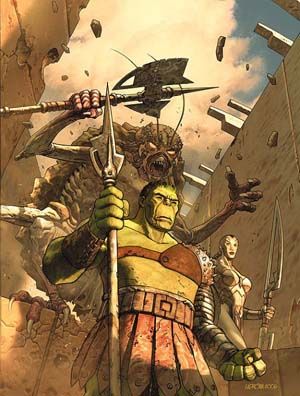
Marvel released a solicitation for Incredible Hulk #100 at yesterday's Joe Friday's column.
Be warned, below there be SPOILERS!!!
I'm not only surprised at the revelations of this solicitation, but at the fact it was released at all! It gives away two pretty major plot points: 1) that whatever comes of the conflict between Hulk and Miek that we just saw at the end of Hulk #97, apparently they emerge as comrades, and 2) Caiera Oldstrong, the character who has - so far - been pumped up as perhaps the most dangerous of Hulk's adversaries, has joined forces with him! And remember, we're still waiting to see the issue where Hulk and Caiera fight!
You know, it's funny. I'm not going to provide a link because the effort wouldn't be worth it, and I don't want to embarass the poster in question, but maybe a month ago on the CBR forums, I read a post from a guy complaining that Marvel had "lied to us." He wasn't complaining about scheduling or shoddy treatment of creators. He was complaining about Marvel's misleads in their advertising. For example, he complained about the covers to recent issues of Fantastic Four that suggested Doctor Doom might pick up Thor's hammer. At the time, I thought the guy was stupid to the degree that he should get special parking for it. First of all, it's not like misleading covers are anything new in the industry. Second of all, the guy was basically complaining that the story was NOT spoiled for him beforehand.
But now that I think about it, it's difficult to dismiss the guy's complaints. When Marvel readers get used to having the solicits give them all the info rather than the comics, what else should they expect?
I decided to make Incredible Hulk an exception to my no-floppy/GN-only rule, at least for the duration of "Planet Hulk" (and perhaps beyond), but now I'm thinking that was a dumb decision. If I hadn't been reading "Planet Hulk" issue-by-issue, this wouldn't be a problem. Even if I saw the solicit before the hardcover collection was released, in most likelihood it wouldn't have stuck with me. Sure I'd probably have to wait until, at the earliest, late next year for the hardcover, but at least I could read the story without knowing everything beforehand rather than being spoiled by the solicit.
I realize this is relatively minor compared to the big clusterfuck over the rescheduling of Civil War, but it pissed me off. I may just decide to drop Hulk, ignore the solicits, and wait until the HC comes out.

Marvel released a solicitation for Incredible Hulk #100 at yesterday's Joe Friday's column.
Be warned, below there be SPOILERS!!!
I'm not only surprised at the revelations of this solicitation, but at the fact it was released at all! It gives away two pretty major plot points: 1) that whatever comes of the conflict between Hulk and Miek that we just saw at the end of Hulk #97, apparently they emerge as comrades, and 2) Caiera Oldstrong, the character who has - so far - been pumped up as perhaps the most dangerous of Hulk's adversaries, has joined forces with him! And remember, we're still waiting to see the issue where Hulk and Caiera fight!
You know, it's funny. I'm not going to provide a link because the effort wouldn't be worth it, and I don't want to embarass the poster in question, but maybe a month ago on the CBR forums, I read a post from a guy complaining that Marvel had "lied to us." He wasn't complaining about scheduling or shoddy treatment of creators. He was complaining about Marvel's misleads in their advertising. For example, he complained about the covers to recent issues of Fantastic Four that suggested Doctor Doom might pick up Thor's hammer. At the time, I thought the guy was stupid to the degree that he should get special parking for it. First of all, it's not like misleading covers are anything new in the industry. Second of all, the guy was basically complaining that the story was NOT spoiled for him beforehand.
But now that I think about it, it's difficult to dismiss the guy's complaints. When Marvel readers get used to having the solicits give them all the info rather than the comics, what else should they expect?
I decided to make Incredible Hulk an exception to my no-floppy/GN-only rule, at least for the duration of "Planet Hulk" (and perhaps beyond), but now I'm thinking that was a dumb decision. If I hadn't been reading "Planet Hulk" issue-by-issue, this wouldn't be a problem. Even if I saw the solicit before the hardcover collection was released, in most likelihood it wouldn't have stuck with me. Sure I'd probably have to wait until, at the earliest, late next year for the hardcover, but at least I could read the story without knowing everything beforehand rather than being spoiled by the solicit.
I realize this is relatively minor compared to the big clusterfuck over the rescheduling of Civil War, but it pissed me off. I may just decide to drop Hulk, ignore the solicits, and wait until the HC comes out.
Wednesday, August 16, 2006
The Daily Burn is dead, long live Superheroes, etc.
You know how - with ASM and FF, among others - Marvel decided to continue with the original numbering, apparently because they figured that 10 years from now even all the relaunches since the 90's wouldn't confuse new readers enough? That's how I feel right now.
As you may know, I originally blogged on a site called the Daily Burn. I abandoned that blog in late 2005 for Superheroes, etc. But, I kept the blog up and even some of the links you'll find on my sidebar linked to it.
I have just finished copying and pasting the most relevant posts from the Burn into Superheroes, etc., back-dating them so they appear in the archive rather than crowding the recent posts (they all have their original dates and times), and finally deleting The Daily Burn for good. I'm pretty sure I've updated all the links in the sidebar to reflect this, but if you notice anything out of whack, let me know. I apologize to anyone who gets ticked off by this, but I couldn't figure out a way to transfer the comments from the Burn into the posts here.
In part, I did this to get organized. Unfortunately, the idea arose because of something a bit more unnerving.
Since happily accepting ADD's invitation to make Superheroes, etc. a satellite site for Comic Book Galaxy, I've had a significant increase in hits (by the way, thanks both to ADD for the invitation and to all the readers who have been kind enough to stop by Superheroes, etc.). I was checking the hits yesterday and noticed a surprisingly large number of them were coming from the Daily Burn.
The reason, I soon realized, was a bit of a satirical piece I posted some time ago. The original concept of the Daily Burn was that it would be a comic book version of The Onion. I posted mock news articles for laughs. I quickly abandoned that idea, preferring straight commentary. But before the gears shifted, I wrote a mock article titled "STUDY CONFIRMS: NINJAS SUCK." It was poking fun at both the relegation of what have always been nigh-unbeatable warriors into mere cannon fodder in superhero comics; and the fact that so many TV shows, movies, comics, etc., portrayed ninjas as heroes when - as far as I know - in real life they were paid assassins.
Even though the Burn was completely dormant, this parody continued to draw steady attention, particularly from message boards dedicated to arguing over whether Ninjas were better than Pirates (something the second issue of Street Angel had fun with). I don't know where the whole Ninjas vs. Pirates thing came from, but it was funny and harmless, and I thought it was cool these N v. P guys were putting links to the article in their sigs.
Unfortunately, in the last few days something a bit more disturbing happened. There were hits to the Daily Burn coming from a martial arts dojo's message board, and in particular someone responded to the article saying that I would be killed in my sleep. There were a few other angry, non-threatening posts. At first, I took it as a joke. I still think it was a joke. But this is the Internet, and one of the downfalls of the net is that you can't hear the voice behind the words, and unless they say "I'm kidding," or put one of those winky-smiley things in their post, you never really know, do you? And I know there are people who are into martial arts (I certainly hope it's the minority) who get very stupid about it and might actually try to make good on their threats. At my first college I worked at the campus radio station, and we had to kick out a DJ who pulled a fucking samurai sword on another DJ because he hadn't met him and thought he was trying to break into the place. That's the kind of guy I worry about.
So basically, I wanted to distance myself from the Burn as much as possible, and this was something I had been considering anyway.
Peruse the archives if you'd like. They now go back to July 2004. I brought over all the reviews and all the relevant commentary. The only stuff I didn't bring over were posts like "I haven't posted in a while because I'm busy" and "Hey, this site over here is updated!" Oh, and obviously the Ninja article and all the other mock articles are gone.
As you may know, I originally blogged on a site called the Daily Burn. I abandoned that blog in late 2005 for Superheroes, etc. But, I kept the blog up and even some of the links you'll find on my sidebar linked to it.
I have just finished copying and pasting the most relevant posts from the Burn into Superheroes, etc., back-dating them so they appear in the archive rather than crowding the recent posts (they all have their original dates and times), and finally deleting The Daily Burn for good. I'm pretty sure I've updated all the links in the sidebar to reflect this, but if you notice anything out of whack, let me know. I apologize to anyone who gets ticked off by this, but I couldn't figure out a way to transfer the comments from the Burn into the posts here.
In part, I did this to get organized. Unfortunately, the idea arose because of something a bit more unnerving.
Since happily accepting ADD's invitation to make Superheroes, etc. a satellite site for Comic Book Galaxy, I've had a significant increase in hits (by the way, thanks both to ADD for the invitation and to all the readers who have been kind enough to stop by Superheroes, etc.). I was checking the hits yesterday and noticed a surprisingly large number of them were coming from the Daily Burn.
The reason, I soon realized, was a bit of a satirical piece I posted some time ago. The original concept of the Daily Burn was that it would be a comic book version of The Onion. I posted mock news articles for laughs. I quickly abandoned that idea, preferring straight commentary. But before the gears shifted, I wrote a mock article titled "STUDY CONFIRMS: NINJAS SUCK." It was poking fun at both the relegation of what have always been nigh-unbeatable warriors into mere cannon fodder in superhero comics; and the fact that so many TV shows, movies, comics, etc., portrayed ninjas as heroes when - as far as I know - in real life they were paid assassins.
Even though the Burn was completely dormant, this parody continued to draw steady attention, particularly from message boards dedicated to arguing over whether Ninjas were better than Pirates (something the second issue of Street Angel had fun with). I don't know where the whole Ninjas vs. Pirates thing came from, but it was funny and harmless, and I thought it was cool these N v. P guys were putting links to the article in their sigs.
Unfortunately, in the last few days something a bit more disturbing happened. There were hits to the Daily Burn coming from a martial arts dojo's message board, and in particular someone responded to the article saying that I would be killed in my sleep. There were a few other angry, non-threatening posts. At first, I took it as a joke. I still think it was a joke. But this is the Internet, and one of the downfalls of the net is that you can't hear the voice behind the words, and unless they say "I'm kidding," or put one of those winky-smiley things in their post, you never really know, do you? And I know there are people who are into martial arts (I certainly hope it's the minority) who get very stupid about it and might actually try to make good on their threats. At my first college I worked at the campus radio station, and we had to kick out a DJ who pulled a fucking samurai sword on another DJ because he hadn't met him and thought he was trying to break into the place. That's the kind of guy I worry about.
So basically, I wanted to distance myself from the Burn as much as possible, and this was something I had been considering anyway.
Peruse the archives if you'd like. They now go back to July 2004. I brought over all the reviews and all the relevant commentary. The only stuff I didn't bring over were posts like "I haven't posted in a while because I'm busy" and "Hey, this site over here is updated!" Oh, and obviously the Ninja article and all the other mock articles are gone.
Tuesday, August 15, 2006
Doctor Mid-Nite
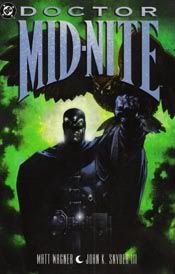 By Matt Wagner, John K. Snyder III, and Ken Bruzenak
By Matt Wagner, John K. Snyder III, and Ken BruzenakPublished by DC; $19.95 US/$31.00 CAN
Collects Doctor Mid-Nite #1-#3
It was, in part, Tim O’Neil’s review of Martian Manhunter #1 that persuaded me to review Doctor Mid-Nite. Tim’s commentary regarding the never-ending revamping of J’onn J’onzz put me in mind of all the recent and upcoming won’t-last-more-than-a-year revamps of never-selling characters at both Marvel and DC, which in turn reminded of one of the few examples – of which I’m aware – of a creative team doing the thing right.
Which isn’t to say that I’m at all familiar with the original Doctor Mid-Nite, and in fact I’m fairly ignorant concerning the more complex continuity elements of the DCU. That’s hardly a weakness in reading Doctor Mid-Nite though, as Wagner gives us a brand new character in an updated guise.
In a rare example of a superhero comic achieving the narrative goal that every writer of masked crusaders claims is his, but rarely meets, the man behind the mask is what drives Doctor Mid-Nite. The proof is in the simple fact that, while reading the first chapter of the trade, I was getting very impatient with a reveal that would never come.
Let me explain. Doctor Mid-Nite is narrated by Carmilla Marlowe, a young web designer and wanna-be novelist suffering from a rare condition that causes her skin to burn when in direct sunlight. The only help Marlowe has found for her predicament is A39, an illegal steroid. Marlowe meets Dr. Cross, who quickly sniffs out the woman’s illness, while getting a fix from her regular dealer. Cross convinces Marlowe to let him treat her condition without the drug, and eventually Carmilla learns her mysterious doctor is into more than just giving free medical advice to self-medicating web designers. She accompanies him as he donates medical supplies to homeless shelters, condoms to prostitutes, distracts himself by dabbling in robotics and molecular chemistry, and apparently wrangles in reformed gang-bangers – among others – to act as muscle and reconnaissance in his altruistic endeavors. In fact, the only reason he runs into Marlowe is because he takes it upon himself to do some undercover research on A39. When a scientist developing a chemical to fight oil spills is kidnapped, Cross gets involved. A bartender in the employ of the kidnappers poisons Cross with A39, and the effects force Cross into a car accident. While attempting to help his unintended victims, Cross is blinded when the engine of their car explodes. He eventually discovers that, like his predecessor, somehow the combination of the A39 and the accident manage to blind him only in the daytime, while he can see perfectly in darkness.
The reveal I referred to above, that I was waiting for and that never came; was of how we were going to find out, before his accident, that Cross was already donning a mask and fighting evil. The guy had a space-age house with an electronic voice as his butler. He spent all his time helping people he didn’t have to help, while at the same time investigating crime. Before he even donned a costume, he felt like equal parts Batman and the older, more theatrical pulp heroes. The fact that he wasn’t already a superhero threw me for a loop, and it felt strangely refreshing to meet a character who was a bonafide hero before he became a superhero. The accident that blinds him isn’t what inspires him to go on a crusade, it’s what enables to him to fight the crusades he’s already fighting on a more direct level. The costume and the pseudonym almost feel unimportant. They don’t represent a Batman/Wayne duality, but rather a simple necessity in order to give him a hook and inject him into the world of superheroes. Because of this, in spite of the deliciously cheesy lines he sometimes belts out and the uber-renaissance man that would be tough to swallow in a less "super" medium; Doctor Mid-Nite is one of the most believable, fallible, and altogether human superhero characters I’ve come across.

Humanizing superheroes is one of Wagner’s greatest strengths, and here it doesn’t stop with merely the concept of a hero-turned-superhero. One thing that bothers me about the majority of superhero comics – and it’s something that’s become so commonplace that it’s only when I read something like Doctor Mid-Nite, or watch a show like Batman: The Animated Series or Justice League that I’m even reminded of it – is how writers pander to the versus-debate crowd by fearing to portray their lead characters as anything but well-oiled ass-kicking machines. The possibility that the hero might actually lose is a joke not worth mentioning, and the idea of a genuinely suspenseful superhero comic is equally laughable. If there are any Marvel readers left who can ask "Oh, but could Wolverine possibly win this fight?", I both envy their ignorance and pity them for what could only be a crushing disappointment when they hear back from Mensa.
 Doctor Mid-Nite, thankfully, is no well-oiled ass-kicker. Moments after his first genuine "super" battle – a relatively short tussle with a steroid-amped thug – he collapses in exhaustion. Later in the trade, when another thug shoots at him, he doesn’t duck. He doesn’t leap-frog with ease through a web of bullet motion-lines. He gets. Fucking. SHOT. Even in the end, he fails to completely stop the machinations of the bad guys.
Doctor Mid-Nite, thankfully, is no well-oiled ass-kicker. Moments after his first genuine "super" battle – a relatively short tussle with a steroid-amped thug – he collapses in exhaustion. Later in the trade, when another thug shoots at him, he doesn’t duck. He doesn’t leap-frog with ease through a web of bullet motion-lines. He gets. Fucking. SHOT. Even in the end, he fails to completely stop the machinations of the bad guys. And his crusade is no "one-man war against crime!" Before he even dons the mask, Cross develops a vast network of allies. The beefcake Nite-Lite, the weasely and homeless Lemon, the mute lawyer Mouthpiece, and eventually Carmilla back him up every step of the way. We never get the usual, this-is-something-I-have-to-do-alone-I-can’t-ask-you-to-put-yourself-in-harm’s-way-I’m-the-guy-on-the-cover-of-the-comic, ASSHOLE. In the climactic battle of the trade, Doctor Mid-Nite does the unthinkable. He calls the feds for back-up. He calls duly authorized law enforcement agents who are actually legally mandated to do this kind of shit and, get this, actually tells them what’s going on! It’s like the world’s turned upside down! Are me and Brad Pitt the same person? Am I really dead and that creepy kid’s too much of an asshole to tell me? What’s in the box? WHAT’S IN THE FUCK-ING BOX?!?!?!
What I’ve neglected to mention so far is John K. Snyder’s beautiful hand-painted illustrations. Before picking up this trade I was a little disappointed that Wagner had not, as usual, penciled his own story, but Snyder’s work makes up for it. His wild coloring and panel design make every page different from the next, and his hard edges and tendency to illustrate the more muscleman-y characters from feet-to-shoulders in a big, menacing "V" is reminiscent of Bill Sienkiewicz ( = good thing).
I don’t know if Wagner or Snyder ever had ambitions for Doctor Mid-Nite to become a regular monthly (and considering that Wagner seems to prefer working on mini-series, my guess would be they didn’t), but if so, then the welcome failure of Pieter Cross to feel like any other hero on the stands is probably to blame for its absence.
If you’ve never read Doctor Mid-Nite and somehow my review has managed to spark your interest, but you’re concerned with what seems like a fairly high price tag for the collection of a 3-issue mini, don’t be. Like another mini from Wagner, Trinity, each chapter of Doctor Mid-Nite is close to 50 pages long, and I’d wager it will read better than most of the other DC or Marvel trades you might find out there, regardless of length.
Labels:
Graphic Novel/Comic Book Reviews
Linkage - ADD interviews Brubaker/Leong bashes Wizard
Alan Doane puts Five Questions to Ed Brubaker, mainly concerning the new Brubaker/Phillips series Criminal, and also some discussion of the regrettably late series by the duo, Sleeper.
Also, via Just A Fanboy, I found a video blog clip from Comic Foundry in which Tim Leong takes pot-shots at Wizard.
A debate in the comments section of the Foundry's blog is brewing. I got into it a little bit, talking about the subject of obectification of women on Wizard's covers. In a nutshell I said, yeah, objectification is bad, but complaining about the objectification on Wizard's covers is a little bass-ackwards, considering how women are objectified in the comics the magazine writes about. It's not, as Leong seemed to think, a matter of journalistic integrity in my mind. It's a matter of a magazine accurately reflecting the disgusting treatment of female characters in top-selling comics. You want Wizard to stop putting fanboy stroke material on their covers, tell Marvel and DC to stop drawing their women like the "money shot" is just a few pages away. Otherwise, it's like complaining that a historical journal covering war focuses on violence too much.
Also, via Just A Fanboy, I found a video blog clip from Comic Foundry in which Tim Leong takes pot-shots at Wizard.
A debate in the comments section of the Foundry's blog is brewing. I got into it a little bit, talking about the subject of obectification of women on Wizard's covers. In a nutshell I said, yeah, objectification is bad, but complaining about the objectification on Wizard's covers is a little bass-ackwards, considering how women are objectified in the comics the magazine writes about. It's not, as Leong seemed to think, a matter of journalistic integrity in my mind. It's a matter of a magazine accurately reflecting the disgusting treatment of female characters in top-selling comics. You want Wizard to stop putting fanboy stroke material on their covers, tell Marvel and DC to stop drawing their women like the "money shot" is just a few pages away. Otherwise, it's like complaining that a historical journal covering war focuses on violence too much.
Sunday, August 13, 2006
Fantastic Four: Unthinkable
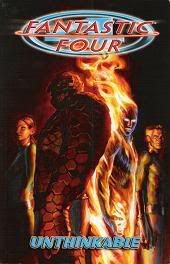 By Mark Waid, Mike Wieringo, Casey Jones, Paul Mounts, Chris Eliopoulus, Rus Wooton, and Paolo Rivera
By Mark Waid, Mike Wieringo, Casey Jones, Paul Mounts, Chris Eliopoulus, Rus Wooton, and Paolo RiveraPublished by Marvel; $17.99 US/$29.00 CAN
Collects Fantastic Four #67-#70, #500-#502
I had mixed feelings about picking up Unthinkable. I started my floppy-fast shortly after the Waid/Wieringo run began, the return of Doctor Doom enjoyed some nice buzz when it came out in single issues, and so initially I was looking forward to the trade. The fact that the trade quickly disappeared from the relatively comprehensive Marvel/DC graphic novel shelves at my local comic shop and – at least whenever I’ve remembered to check – has since failed to reappear, further convinced me it was worth tracking down. But then I managed to get a copy of Rising Storm – the trade collecting the final Waid/Wieringo FF issues – and was pretty under-whelmed.
Unthinkable manages to live up to its name in more ways than one, not the least of which being that it’s the only collection of issues from the FF’s home title that I now consider essential to my collection.
The first chapter is perhaps the most impressive, following Doctor Doom – sans armor or any other technological enhancements, save a simple metal mask covering his face – through a Georgia tourist trap as he hops from one fortune teller to the next in search of his wayward lover, Valeria. The story ends with a grisly and wonderfully executed surprise, made that much more effective by Waid’s ability to humanize Doom (I’d imagine his past work on Empire served him well while working on Unthinkable). Even though I’ve never been a big FF fan, I’ve always had a soft spot for Doom (it was the only thing that made me regret trading off the largely disappointing Essential Super-Villain Team-Up a few weeks ago), and Waid handles him just the way I like him: quietly menacing at times, while occasionally belting out the traditional, booming decrees and threats that should always end with “I AM DOOM!!!!!!!!!!!!!”
The second chapter opens with the same relatively light-hearted tone the Waid/Wieringo run presented its reader before Unthinkable, with Ben and Johnny locked in their constant war of practical jokes, and it almost feels like the entire pre-Unthinkable run was so light just to knock readers off-balance once Doom came back to the playground. I can’t claim to be an avid FF reader, but I’ve seen good chunks of the book, and I’ve never seen it get as dark as it does in this collection. The characters endure the kind of violent torture that’s only a few drops of blood away from your average mature readers superhero series, and while I’ve yet to test it by reading subsequent trades, by the end of the story it feels like the emotional aftershocks will keep coming.
In particular, Franklin goes to the kind of dark place you always imagine he would “really” go to, but never has. I’ve never felt it was overly important to give readers of a superhero comic book a story that shows what would “really” happen (because, duh, radiation doesn’t “really” give you super powers, it “really” makes you bleed out of every hole in your body and die), but Franklin’s always pushed the limits of my patience with the kind of it’s-just-a-comic-book mentality I’ve assumed to excuse what would be unacceptable in another fictional medium. It’s always bothered me that with all Franklin’s been through he’s never suffered anything close to the kind of trauma any child would experience from events not nearly as bizarre and devastating as he’s witnessed. Like I said before, I haven’t read tons of FF, but just off the top of my head I can think of stories like Onslaught and Heroes Reborn: The Return in which Franklin was put in a position that would drive any kid his age completely bugfuck. In Unthinkable, we finally see Franklin suffer the chilling after-effects of his parent’s lifestyle. We never know exactly what Franklin endures while under the care of the demons who lend Doom his magical might, but Waid uses a wonderful device in the penultimate chapter of the trade – involving a discussion between Reed, Sue, and Franklin’s therapist – to be non-specific enough to keep the book kid-friendly, while planting seeds in the darker adult minds. My only complaint with this aspect of the story is that, while it’s made clear that Frankin’s trauma lasts until after Unthinkable, there’s a specific symptom of his trauma that’s “cured” by a speech from Ben, and it comes off as just a little too easy.
While I hate giving away well-executed jokes in my reviews, I’m finding it difficult to not produce what is now one of my favorite lines ever in a superhero comic book. It actually made me laugh out loud, which is rare, even with books that are genuinely hilarious cover-to-cover. I won’t reveal the context, but I think the line all on its own is enough:
“This had better not involve Davy Crockett again. You’ve already given that man too much trouble.”
I don’t know why, that just killed me.
Overall, a surprisingly great read. Almost all the FF stories that have ever managed to capture my interest have been mini-series like Big in Japan and Unstable Molecules. Unthinkable is a welcome exception.
Labels:
Graphic Novel/Comic Book Reviews
Saturday, August 12, 2006
Feeling particularly PC
So, as anyone who's ever read this blog with any kind of regularity knows, I work at a public radio station as a control board operator.
I'm not usually interested enough in the shows we air during my shift to pay any more attention than I need to (i.e., I need to know whether or not it's broadcasting, and whether or not anyone's swearing, and it pretty much stops there), the sole exception being This American Life. My station airs the show on Friday night, and last night's show actually managed to piss me off a little bit.
The show, which I'm fairly certain was a repeat (they've been airing a lot of them lately), was titled "Last Words" and it focused on the thoughts, words, and actions during the final moments of life. A little over halfway through the show, the host interviewed an author who had put together a book of Black Box transcripts.
The first thing that struck me was that something seemed particularly stupid about airing a story like that right after the London air-bomb scare. I kissed my girlfriend goodbye today as she left for the airport - bound for Chicago - and while I wasn't exactly shaking in my boots over the thing, I'd be lying if I said it wasn't in the back of my mind. I can't believe I'm the only person, or the only This American Life listener, with a loved one on an airplane today. Maybe from the point of view of the show's producers it would seem silly to air another show just for that, but like I said, they've been broadcasting nothing but repeats lately. How much trouble would it have been to air one that didn't include a somewhat morbid discussion (it was touching, and even funny, as well, but the morbid was still very much there) about the last words of pilots during a time when you can't bring so much as nail polish on a plane?
The other thing that pissed me off, and this is where I really felt the PC boiling, was an anecdote about a China Airlines flight that crashed. The author told the story after the host prompted him by saying that, in some of these transcripts, it was clear that the pilots died because of "sheer stupidity." If I remember correctly, the plane was coming down too fast, the pilots were blinded by fog, and the Black Box recorded the sound of the man in the control tower screaming "Pull up! Pull up!" over the pilot's headphones. The last words of the pilot were "What means 'Pull up?'"
So, presuming the pilot of the China Airlines flight was Chinese, then the fact that a Chinese man isn't fluent in English is an example of "sheer stupidity?"
I don't know. Maybe I'm making too much out of it. I should say that if the show wasn't so fucking phenomenal, I wouldn't bother to complain in the first place. And in spite of the fact that I think this was an inappropriate time for this show, it was up to their usual standard of excellence. They ended with a short story by Tobias Wolff that nearly brought me to tears. They just usually tend to be more sensitive about these things.
Likely, the China Airlines piece wouldn't even have upset me if the Black Box story as a whole hadn't already struck a nerve.
I'm not usually interested enough in the shows we air during my shift to pay any more attention than I need to (i.e., I need to know whether or not it's broadcasting, and whether or not anyone's swearing, and it pretty much stops there), the sole exception being This American Life. My station airs the show on Friday night, and last night's show actually managed to piss me off a little bit.
The show, which I'm fairly certain was a repeat (they've been airing a lot of them lately), was titled "Last Words" and it focused on the thoughts, words, and actions during the final moments of life. A little over halfway through the show, the host interviewed an author who had put together a book of Black Box transcripts.
The first thing that struck me was that something seemed particularly stupid about airing a story like that right after the London air-bomb scare. I kissed my girlfriend goodbye today as she left for the airport - bound for Chicago - and while I wasn't exactly shaking in my boots over the thing, I'd be lying if I said it wasn't in the back of my mind. I can't believe I'm the only person, or the only This American Life listener, with a loved one on an airplane today. Maybe from the point of view of the show's producers it would seem silly to air another show just for that, but like I said, they've been broadcasting nothing but repeats lately. How much trouble would it have been to air one that didn't include a somewhat morbid discussion (it was touching, and even funny, as well, but the morbid was still very much there) about the last words of pilots during a time when you can't bring so much as nail polish on a plane?
The other thing that pissed me off, and this is where I really felt the PC boiling, was an anecdote about a China Airlines flight that crashed. The author told the story after the host prompted him by saying that, in some of these transcripts, it was clear that the pilots died because of "sheer stupidity." If I remember correctly, the plane was coming down too fast, the pilots were blinded by fog, and the Black Box recorded the sound of the man in the control tower screaming "Pull up! Pull up!" over the pilot's headphones. The last words of the pilot were "What means 'Pull up?'"
So, presuming the pilot of the China Airlines flight was Chinese, then the fact that a Chinese man isn't fluent in English is an example of "sheer stupidity?"
I don't know. Maybe I'm making too much out of it. I should say that if the show wasn't so fucking phenomenal, I wouldn't bother to complain in the first place. And in spite of the fact that I think this was an inappropriate time for this show, it was up to their usual standard of excellence. They ended with a short story by Tobias Wolff that nearly brought me to tears. They just usually tend to be more sensitive about these things.
Likely, the China Airlines piece wouldn't even have upset me if the Black Box story as a whole hadn't already struck a nerve.
Thursday, August 10, 2006
Review - The Incredible Hulk #97
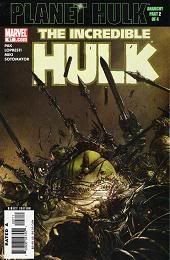 The Incredible Hulk #97
The Incredible Hulk #97By Greg Pak, Aaron Lopresti, Danny Miki, Chris Sotomayor, Randy Gentile, and Ladrönn
$2.99 US
WAR! What is it good for? The best Hulk storyline this side of 1998, that’s what.
Last issue brought us the opening shots, and the fierce revolt we’ve been waiting for breaks out across Sakaar in "Planet Hulk: Anarchy, Part 2." The Red King rains fire down on his subjects in Crown City, Hulk and his allies invade the Maw, and dissension brews in the ranks as the Hulk grows unsure of how much blood he’s willing to spill.
This last aspect of the issue is my favorite. While reveling in battle and still close to his "warbound" companions, we see the Hulk questioning his own thirst for revenge as it’s mirrored in characters like Elloe and Miek. His search for his own humanity comes in conflict with his loyalty and his darker self, and eventually it leads him to try to do what he’s always done: remove himself from the situation and strike out on his own. Pak doesn’t give us any narration or inner dialogue to betray Hulk’s thoughts, and even his dialogue is sparse, but his actions show us everything. And I should mention the green guy’s attempt to separate himself from his allies leads to one of the best endings we’ve seen so far in "Planet Hulk."
But something’s been bothering me ever since "Planet Hulk: Anarchy" began and I think I’ve finally put my finger on it.
While it started out as a gladiator story, "Planet Hulk" has become a war epic, and with open war finally breaking out on Sakaar, I’m hungry as hell for the kind of big double-page spreads of battle scenes that saw so much overuse in CrossGen’s late titles. Obviously, pumping those pages out every issue didn't save CrossGen from drowning, but "Planet Hulk" feels like the kind of storyline that that kind of treatment could serve. I’m hungry for big, Brath-y, silent panels of nothing but swords, lasers, big freaking axes and blood, blood, blood!
But I’m not putting that in the minus column just yet. I’m trusting that Hulk’s creative team is doing what the creators of CrossGen never learned to do: building up to the big moments rather than killing the effect by filling each issue with nothing but those scenes. And the fact that I’m so bloodthirsty for it is probably more of a testament to a skillful building of suspense than anything else.
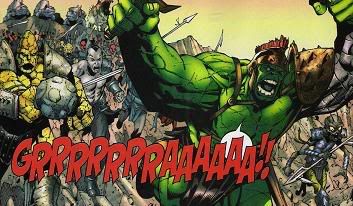
No BS. No pandering. It has been so long that I could say something like "I can’t believe I have to wait a month for the next issue!" about Hulk or any other comic for that matter. And it feels good.
Labels:
Graphic Novel/Comic Book Reviews,
Hulk
Tuesday, July 25, 2006
Post-Shingles Reviews
And the shingles are gone! Time for some bloggin', Martin style!
So, since I haven't been blogging in a while, but I've read quite a bit in the past few weeks, I thought I'd start off with brief reviews of some of the books I've picked up recently.
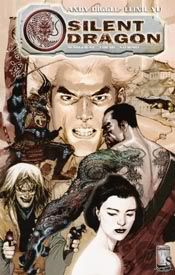 Silent Dragon
Silent Dragon
By Andy Diggle and Leinil Francis Yu
Published by DC/Wildstorm; $19.99 US
Collects Silent Dragon #1 - #6
Silent Dragon is set in a futuristic Japan where mechanized samurai and ninja police the populace. The lead, Renjiro, serves a supposedly idealistic yakuza boss with dreams of "protecting" his countrymen from the government and re-instituting bushido as the nation's governing principle. Renjiro is falsely accused of betraying his master and submits to seppuku in order to protect the real traitor: his master's wife. Once resurrected in a cybernetic body by a government agency, Renjiro goes on a mission to get revenge on his former master, win back his true love, and slip free of the back-stabbing and elusive government agent who brought him back to life.
Silent Dragon is the only book reviewed here that's come out in the last couple of weeks, and I went into it completely blind. I hadn't read any of the single issues, seen past work from any of the creators involved, or any promo stuff for the series. My post-Lone-Wolf-and-Cub mad-on for samurai stuff is all that drew me to Silent Dragon, and it didn't steer me wrong. Yu's classical Japanese settings, like the yakuza boss' home in the beginning of the book, are just as stunning as his uber-mechanized samurai. I'd heard praise for Andy Diggle's work before, but never had the chance to experience it for myself, and now I know what all the fuss is about. Silent Dragon often feels like a faster-paced Sleeper, and makes me wonder if the mini might not have been somewhat less enjoyable if read issue-by-issue. Without giving too much away, the conclusion kicks you hard in the chest, and the nature of it is refreshing in the kind of tale that tends to hold the concept of the medieval Japanese warrior as a purer and more desirable alternative to modern life. While I love my seppuku and my katanna-slicin', I tend to doubt the samurai were any more or less heroic than their European counterparts, or that the ideals that put swords in their hands were necessarily any purer.
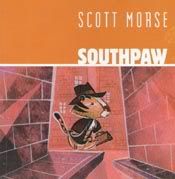 Southpaw
Southpaw
By Scott Morse
Published by AdHouse Books; $9.95 US
So, when I decided to broaden my horizons and start reading books that had less to do with superheroes and more to do with "etc.," I stopped by ADD’s Blog and started clicking madly on all the links he’s got to the companies that publish things like 300-page tomes of a Brazilian chick on a beach or love stories with anthropomorphic hippos . You know, silly stuff. Not the kind of serious literature you’d expect from Heroes for Hire or Blue Beetle (and I was a little surprised that some of those sites, like Ait-planetlar and Fantagraphics, are on my employer’s restricted list). At AdHouse’s site I saw a Scott Morse book called Southpaw about a tiger, apparently introduced in Project: Telstar, who fought robots. And it was by Scott Morse, whose work I’d reviewed just a little bit. And I thought hey! Robot-fightin’ tiger-man! I can get down with that! I can be all artistic and shit! Remembering that cool boxing scene in Ancient Joe, I figured I was in for a treat.
And I was, but it wasn’t what I expected. The story of Southpaw is told in single, uncolored panels on orange paper. Its protagonist is mute, and the story is a familiar one: the boxer who refuses to take a dive and flees from the criminals who would punish him for it. Except with robots. And a tiger.
I was disappointed with Southpaw at first and was pretty sure it would end up on my trade list at Sequential Swap. The story seemed short for its price tag, at first I found the orange paper a little abrasive, and there were a few pages - for example, one showing the twisted remains of a defeated robot - where I had trouble simply figuring out what was going on.
But I just couldn’t bring myself to let it go. Southpaw’s characters are few, but well-defined with minimal treatment. A scene towards the end - when the main character briefly reunites with his children - though only a handful of panels long with hardly any dialogue, was one of the most endearing and sad scenes I’ve ever read in a graphic novel. Without words, Morse created a loveable and tragic hero-on-the-run, and I honestly don’t think I’m a good enough reader yet to tell you how. I can say that rather than regretting the price tag, I’ve come to appreciate the brevity, because it means I can re-read it before any other grown-ups figure out I’m flipping through a funnybook about a robot-fightin’ tiger-man. It’s certainly my favorite of the graphic novels reviewed here, and I think I’ve found a creator whose work can act as a door to all those strange comics that have nothing to do with Hulk smashin’.
(not that there’s anything wrong with Hulk smashin’, he’s apparently the strongest one there is)
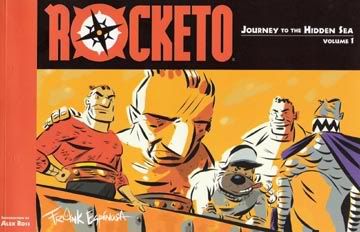
Rocketo: Journey to the Hidden Sea, Vol. 1
By Frank Espinosa and Marie Taylor
Published by Image; $19.99 US
Collects Rocketo #0 - #6
When I mentioned my “post-Lone-Wolf-and-Cub mad-on for samurai stuff” earlier, I don’t think I was completely accurate. Lone Wolf and Cub didn’t leave me hungry for samurai vengeance tales as much as epic adventure stories. Stories with the heroism and action of superhero comics; while blessed with the negligible story qualities most superhero stuff lack like forward-moving characterization, humanity, and narrative conclusions. I was hungry for Conan and ElfQuest and Age of Bronze. I was hungry for The Odyssey.
I never imagined Rocketo would be one of the books to fill that need. I remember when I saw the preview at Newsarama and thinking, “Oh, please make it to a trade, make it to a trade.” I remember breathing a sigh of relief when it was announced Image would save Rocketo from the death of Speakeasy. Still, I never thought Rocketo would be the book it is. Just judging by the art I guess, I figured its main character - with a shirt that looked like Aquaman’s and everything from the bridge of his nose to his chin looking like it was culled from Fred Flinstone - would be a finely rendered Flash Gordon parody. His willful companion Spiro had a face like Chubby Da Choona from Seaguy and the ninja-like Boaz looked like a pez dispenser from Hell. I guess I can’t blame myself for expecting the book to be a skillfull, yet silly action romp.
Rocketo Garrison is no parody, but a daydreaming hero scarred by war. Rocketo feels more like The Odyssey than any comic I’ve come across, and not just because the first chapter (from Rocketo #0) is a direct homage to part of the Greek hero’s adventures. Espinosa uses the post-apocalyptic setting to create a land of fantasy rather than the bleak wastelands, bursting with weighty social commentary, that you find in most post-apoc tales. The worldwide disaster opens the way for men like Rocketo and his ancestors to revel in the kind of adventure that fueled Odysseus’s soul. While there’s certainly humor in the book, the cartoon-y style doesn’t render its heroes any less serious nor its villains any less terrible. The style succeeds in giving the story an epic feel that I never thought possible with such a strong element of cartoon. I am far too dumb to adequately describe the book’s incredible art, I just know I’m chomping at the bit for those floppies to come out, so they can hurry up and release the second TPB.
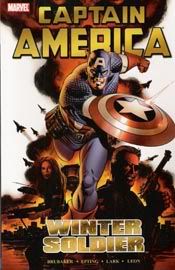 Captain America: Winter Soldier, Vol. 1
Captain America: Winter Soldier, Vol. 1
By Ed Brubaker, Steve Epting, Michael Lark, John Paul Leon, and Tom Palmer
Published by Marvel; $16.99 US
Collects Captain America, Vol. 5, #1 - #7
If I were to ever find myself in Marvel’s Bullpen, Captain America would probably be the last character I’d want to handle. While I’m still on the fence as to whether or not there just aren’t any more interesting directions to take the decades-old superheroes of the Big Two, Captain America is particularly problematic. His identity as a leader has become such a defining characteristic that the prospect of reading his solo adventures just seems silly. I’m just so used to fight scenes with someone like Justice thinking “Wow, Cap is so brave! And smart! And handsome! I can’t believe I get to punch people alongside him!” And his morality is so set-in-stone that trying to introduce anything innovative in his characterization, no matter how negligible, is bound to piss a whole lot of people off. Hardcore wing-head fans liken Mark Gruenwald’s Cap run to a sacred text these days, but I remember the letters pages back in the day, and fans weren't writing love notes to the guy; particularly when Gruenwald had Cap blow away a guy with an uzi, and later when Cap temporarily gave up his title. I wouldn’t say fan-favorite dartboard targets like Austen and Bendis had it easy in comparison, but that’s only because the Internet was just a glimmer in Al Gore’s eye back when Gruenwald was scribing Cap.
I don’t know if it would be right to say Brubaker and Epting have worked magic with Captain America, but the fact that I intend to pick up a copy of Captain America: Winter Soldier, Vol. 2 proves its predecessor a success, simply because it’s the first time in a long while that I’ve given a damn about the character or the comic. I don’t think this is a result of Brubaker revealing anything new or insightful about Steve Rogers. I think Marvel has been at a loss as to what the hell to do with Cap for years. He’s a marquee-level character in name, but as far as buzz is concerned until now he’s been somewhere around Brother Voodoo and Man-Thing (unless you count the brief spike in Cap-chatter the release of Truth caused). Brubaker’s just applied a model he’s had success with in other books to one of Marvel's most stagnant characters, and because it’s a model Brubaker’s adept at molding, presto, people are actually buying the thing.
Which isn’t to say it isn’t good, solid espionage storytelling, because it is. It’s suspenseful and engaging, with great, mostly “silent,” action sequences by Steve Epting, and it leaves you wanting more. But it’s no Sleeper, and the only real innovation here is that one Cap rule that Brubaker shamelessly broke (and I won’t spoil it, even though I doubt there’s anyone left for whom it would be a spoiler).
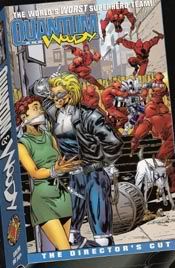 Quantum & Woody: The Director’s Cut
Quantum & Woody: The Director’s Cut
By Christopher Priest and M.D. Bright
Published by Acclaim Comics; $7.95 US (Out of print, so you’re probably going to have to dish out more than the cover price)
Collects Quantum & Woody #1 - #4
I’ve been hunting for this goddamn trade for years. I heard about it when Priest’s Black Panther was in full-swing, and the descriptions from fans plus Priest’s skill on BP made it look too good to not pursue. I don’t think I’m exaggerating when I say that EVERY SINGLE TIME I’ve browsed through Sequential Swap’s trade list that I’ve clicked on the “Q,” saw almost nothing by Queen and Country collections, sighed and surfed onwards. Once it finally showed up, I jumped on it, and luckily I had just filled my own swap list with enough not-completely-bad books that the swapper was willing to give up the goods.
The bad news is that Quantum & Woody was worth the wait, meaning I'll be hunting down the other three trades, and at this rate my 2-year-old nephew will be a freshman in college before I see the things (along with the hardcover collection for Ultimates 2).
Quantum and Woody are really Eric Henderson and Woody Van Chelton respectively, a pair of childhood “friends” who are,in spite of because of their differences, as close to brothers as you can get without sharing a sperm donor. From their playpen to their nursing home, the pair are constantly at odds, with Woody constantly doing stupid things and dragging his highly intelligent and responsible friend Eric down into his world of stupid. When both of their fathers are killed in a suspicious plane crash, Eric is determined to find the culprit and exact revenge, while Woody is determined to get his father’s money and just hang out. Because of an accident in their fathers’ lab, the pair are forever linked, possessing strange armbands that must be clanged together every 24 hours, or else the both of them will become immaterial.
It’s funny, because I have to stop myself from writing something like “With Quantum & Woody, Priest lets loose with the Everett-Ross goofiness and Tarantino-esque time-shifting, that’s comparatively tame in Black Panther, with hilarious results!.” Which, you know, would be stupid since I keep forgetting Q & W actually came first. Though, I guess, considering Priest’s non-linear storytelling, that would be fitting.
So, with Quantum & Woody, Priest lets loose with the Everett-Ross goofiness and Tarantino-esque time-shifting, that’s comparatively tame in Black Panther, with hilarious results!!!!!
Quantum & Woody succeeds where so many other superhero parodies fail, I think, because Priest and Bright are able to walk a line that so many others plummet over. There’s a lot of superhero parody that’s way too parody and not enough superhero. It’s one of the reasons I could never get into Byrne’s She-Hulk or the JLI creative team’s recent take on Defenders. The stories fall too deeply into the goofiness and the result is humor that’s easy, formulaic, and predictable. Priest and Bright never forget that their heroes are heroes. Quantum looks genuinely cool spinning discs at foes or hopping flagpoles down the side of a building, his white cape billowing behind him in cool, Batman-y ways. There’s enough seriousness and genuine heroism to make the book more than just parody.
It’s freaking hilarious, the art is sweet, and goddammit, it’s out of print.
Okay, that’s enough for tonight.
This has actually been pretty cool: writing a bunch of short reviews rather than longer reviews, one-by-one. I might opt to do more of this from now on.
Though, you know, re-reading a lot of this stuff, I don’t know if I can call myself a reviewer. My stuff is more of a recording of impressions, I guess. Oh well. Whatever. I’m a ‘bloggin’, regardless.
So, since I haven't been blogging in a while, but I've read quite a bit in the past few weeks, I thought I'd start off with brief reviews of some of the books I've picked up recently.
 Silent Dragon
Silent DragonBy Andy Diggle and Leinil Francis Yu
Published by DC/Wildstorm; $19.99 US
Collects Silent Dragon #1 - #6
Silent Dragon is set in a futuristic Japan where mechanized samurai and ninja police the populace. The lead, Renjiro, serves a supposedly idealistic yakuza boss with dreams of "protecting" his countrymen from the government and re-instituting bushido as the nation's governing principle. Renjiro is falsely accused of betraying his master and submits to seppuku in order to protect the real traitor: his master's wife. Once resurrected in a cybernetic body by a government agency, Renjiro goes on a mission to get revenge on his former master, win back his true love, and slip free of the back-stabbing and elusive government agent who brought him back to life.
Silent Dragon is the only book reviewed here that's come out in the last couple of weeks, and I went into it completely blind. I hadn't read any of the single issues, seen past work from any of the creators involved, or any promo stuff for the series. My post-Lone-Wolf-and-Cub mad-on for samurai stuff is all that drew me to Silent Dragon, and it didn't steer me wrong. Yu's classical Japanese settings, like the yakuza boss' home in the beginning of the book, are just as stunning as his uber-mechanized samurai. I'd heard praise for Andy Diggle's work before, but never had the chance to experience it for myself, and now I know what all the fuss is about. Silent Dragon often feels like a faster-paced Sleeper, and makes me wonder if the mini might not have been somewhat less enjoyable if read issue-by-issue. Without giving too much away, the conclusion kicks you hard in the chest, and the nature of it is refreshing in the kind of tale that tends to hold the concept of the medieval Japanese warrior as a purer and more desirable alternative to modern life. While I love my seppuku and my katanna-slicin', I tend to doubt the samurai were any more or less heroic than their European counterparts, or that the ideals that put swords in their hands were necessarily any purer.
 Southpaw
SouthpawBy Scott Morse
Published by AdHouse Books; $9.95 US
So, when I decided to broaden my horizons and start reading books that had less to do with superheroes and more to do with "etc.," I stopped by ADD’s Blog and started clicking madly on all the links he’s got to the companies that publish things like 300-page tomes of a Brazilian chick on a beach or love stories with anthropomorphic hippos . You know, silly stuff. Not the kind of serious literature you’d expect from Heroes for Hire or Blue Beetle (and I was a little surprised that some of those sites, like Ait-planetlar and Fantagraphics, are on my employer’s restricted list). At AdHouse’s site I saw a Scott Morse book called Southpaw about a tiger, apparently introduced in Project: Telstar, who fought robots. And it was by Scott Morse, whose work I’d reviewed just a little bit. And I thought hey! Robot-fightin’ tiger-man! I can get down with that! I can be all artistic and shit! Remembering that cool boxing scene in Ancient Joe, I figured I was in for a treat.
And I was, but it wasn’t what I expected. The story of Southpaw is told in single, uncolored panels on orange paper. Its protagonist is mute, and the story is a familiar one: the boxer who refuses to take a dive and flees from the criminals who would punish him for it. Except with robots. And a tiger.
I was disappointed with Southpaw at first and was pretty sure it would end up on my trade list at Sequential Swap. The story seemed short for its price tag, at first I found the orange paper a little abrasive, and there were a few pages - for example, one showing the twisted remains of a defeated robot - where I had trouble simply figuring out what was going on.
But I just couldn’t bring myself to let it go. Southpaw’s characters are few, but well-defined with minimal treatment. A scene towards the end - when the main character briefly reunites with his children - though only a handful of panels long with hardly any dialogue, was one of the most endearing and sad scenes I’ve ever read in a graphic novel. Without words, Morse created a loveable and tragic hero-on-the-run, and I honestly don’t think I’m a good enough reader yet to tell you how. I can say that rather than regretting the price tag, I’ve come to appreciate the brevity, because it means I can re-read it before any other grown-ups figure out I’m flipping through a funnybook about a robot-fightin’ tiger-man. It’s certainly my favorite of the graphic novels reviewed here, and I think I’ve found a creator whose work can act as a door to all those strange comics that have nothing to do with Hulk smashin’.
(not that there’s anything wrong with Hulk smashin’, he’s apparently the strongest one there is)

Rocketo: Journey to the Hidden Sea, Vol. 1
By Frank Espinosa and Marie Taylor
Published by Image; $19.99 US
Collects Rocketo #0 - #6
When I mentioned my “post-Lone-Wolf-and-Cub mad-on for samurai stuff” earlier, I don’t think I was completely accurate. Lone Wolf and Cub didn’t leave me hungry for samurai vengeance tales as much as epic adventure stories. Stories with the heroism and action of superhero comics; while blessed with the negligible story qualities most superhero stuff lack like forward-moving characterization, humanity, and narrative conclusions. I was hungry for Conan and ElfQuest and Age of Bronze. I was hungry for The Odyssey.
I never imagined Rocketo would be one of the books to fill that need. I remember when I saw the preview at Newsarama and thinking, “Oh, please make it to a trade, make it to a trade.” I remember breathing a sigh of relief when it was announced Image would save Rocketo from the death of Speakeasy. Still, I never thought Rocketo would be the book it is. Just judging by the art I guess, I figured its main character - with a shirt that looked like Aquaman’s and everything from the bridge of his nose to his chin looking like it was culled from Fred Flinstone - would be a finely rendered Flash Gordon parody. His willful companion Spiro had a face like Chubby Da Choona from Seaguy and the ninja-like Boaz looked like a pez dispenser from Hell. I guess I can’t blame myself for expecting the book to be a skillfull, yet silly action romp.
Rocketo Garrison is no parody, but a daydreaming hero scarred by war. Rocketo feels more like The Odyssey than any comic I’ve come across, and not just because the first chapter (from Rocketo #0) is a direct homage to part of the Greek hero’s adventures. Espinosa uses the post-apocalyptic setting to create a land of fantasy rather than the bleak wastelands, bursting with weighty social commentary, that you find in most post-apoc tales. The worldwide disaster opens the way for men like Rocketo and his ancestors to revel in the kind of adventure that fueled Odysseus’s soul. While there’s certainly humor in the book, the cartoon-y style doesn’t render its heroes any less serious nor its villains any less terrible. The style succeeds in giving the story an epic feel that I never thought possible with such a strong element of cartoon. I am far too dumb to adequately describe the book’s incredible art, I just know I’m chomping at the bit for those floppies to come out, so they can hurry up and release the second TPB.
 Captain America: Winter Soldier, Vol. 1
Captain America: Winter Soldier, Vol. 1By Ed Brubaker, Steve Epting, Michael Lark, John Paul Leon, and Tom Palmer
Published by Marvel; $16.99 US
Collects Captain America, Vol. 5, #1 - #7
If I were to ever find myself in Marvel’s Bullpen, Captain America would probably be the last character I’d want to handle. While I’m still on the fence as to whether or not there just aren’t any more interesting directions to take the decades-old superheroes of the Big Two, Captain America is particularly problematic. His identity as a leader has become such a defining characteristic that the prospect of reading his solo adventures just seems silly. I’m just so used to fight scenes with someone like Justice thinking “Wow, Cap is so brave! And smart! And handsome! I can’t believe I get to punch people alongside him!” And his morality is so set-in-stone that trying to introduce anything innovative in his characterization, no matter how negligible, is bound to piss a whole lot of people off. Hardcore wing-head fans liken Mark Gruenwald’s Cap run to a sacred text these days, but I remember the letters pages back in the day, and fans weren't writing love notes to the guy; particularly when Gruenwald had Cap blow away a guy with an uzi, and later when Cap temporarily gave up his title. I wouldn’t say fan-favorite dartboard targets like Austen and Bendis had it easy in comparison, but that’s only because the Internet was just a glimmer in Al Gore’s eye back when Gruenwald was scribing Cap.
I don’t know if it would be right to say Brubaker and Epting have worked magic with Captain America, but the fact that I intend to pick up a copy of Captain America: Winter Soldier, Vol. 2 proves its predecessor a success, simply because it’s the first time in a long while that I’ve given a damn about the character or the comic. I don’t think this is a result of Brubaker revealing anything new or insightful about Steve Rogers. I think Marvel has been at a loss as to what the hell to do with Cap for years. He’s a marquee-level character in name, but as far as buzz is concerned until now he’s been somewhere around Brother Voodoo and Man-Thing (unless you count the brief spike in Cap-chatter the release of Truth caused). Brubaker’s just applied a model he’s had success with in other books to one of Marvel's most stagnant characters, and because it’s a model Brubaker’s adept at molding, presto, people are actually buying the thing.
Which isn’t to say it isn’t good, solid espionage storytelling, because it is. It’s suspenseful and engaging, with great, mostly “silent,” action sequences by Steve Epting, and it leaves you wanting more. But it’s no Sleeper, and the only real innovation here is that one Cap rule that Brubaker shamelessly broke (and I won’t spoil it, even though I doubt there’s anyone left for whom it would be a spoiler).
 Quantum & Woody: The Director’s Cut
Quantum & Woody: The Director’s CutBy Christopher Priest and M.D. Bright
Published by Acclaim Comics; $7.95 US (Out of print, so you’re probably going to have to dish out more than the cover price)
Collects Quantum & Woody #1 - #4
I’ve been hunting for this goddamn trade for years. I heard about it when Priest’s Black Panther was in full-swing, and the descriptions from fans plus Priest’s skill on BP made it look too good to not pursue. I don’t think I’m exaggerating when I say that EVERY SINGLE TIME I’ve browsed through Sequential Swap’s trade list that I’ve clicked on the “Q,” saw almost nothing by Queen and Country collections, sighed and surfed onwards. Once it finally showed up, I jumped on it, and luckily I had just filled my own swap list with enough not-completely-bad books that the swapper was willing to give up the goods.
The bad news is that Quantum & Woody was worth the wait, meaning I'll be hunting down the other three trades, and at this rate my 2-year-old nephew will be a freshman in college before I see the things (along with the hardcover collection for Ultimates 2).
Quantum and Woody are really Eric Henderson and Woody Van Chelton respectively, a pair of childhood “friends” who are,
It’s funny, because I have to stop myself from writing something like “With Quantum & Woody, Priest lets loose with the Everett-Ross goofiness and Tarantino-esque time-shifting, that’s comparatively tame in Black Panther, with hilarious results!.” Which, you know, would be stupid since I keep forgetting Q & W actually came first. Though, I guess, considering Priest’s non-linear storytelling, that would be fitting.
So, with Quantum & Woody, Priest lets loose with the Everett-Ross goofiness and Tarantino-esque time-shifting, that’s comparatively tame in Black Panther, with hilarious results!!!!!
Quantum & Woody succeeds where so many other superhero parodies fail, I think, because Priest and Bright are able to walk a line that so many others plummet over. There’s a lot of superhero parody that’s way too parody and not enough superhero. It’s one of the reasons I could never get into Byrne’s She-Hulk or the JLI creative team’s recent take on Defenders. The stories fall too deeply into the goofiness and the result is humor that’s easy, formulaic, and predictable. Priest and Bright never forget that their heroes are heroes. Quantum looks genuinely cool spinning discs at foes or hopping flagpoles down the side of a building, his white cape billowing behind him in cool, Batman-y ways. There’s enough seriousness and genuine heroism to make the book more than just parody.
It’s freaking hilarious, the art is sweet, and goddammit, it’s out of print.
Okay, that’s enough for tonight.
This has actually been pretty cool: writing a bunch of short reviews rather than longer reviews, one-by-one. I might opt to do more of this from now on.
Though, you know, re-reading a lot of this stuff, I don’t know if I can call myself a reviewer. My stuff is more of a recording of impressions, I guess. Oh well. Whatever. I’m a ‘bloggin’, regardless.
Labels:
Graphic Novel/Comic Book Reviews
Thursday, July 20, 2006
Review - Planet Hulk: Gladiator Guidebook
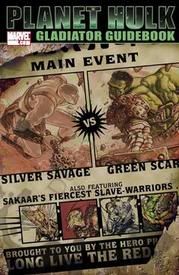 Planet Hulk: Gladiator Guidebook
Planet Hulk: Gladiator GuidebookBy Anthony Flamini, Greg Pak, and various artists
Published by Marvel Comics; $3.99 US
I usually don’t go in for guidebooks, handbooks, “secret files,” or whatever you want to call them. I enjoyed the 1980's Official Handbook of the Marvel Universe when they first came out, but have since regretted the fact that the things ever saw the light of day. I think the idea of cataloguing the specifics of super-heroes and super-villains has led to an RPG-mentality among comics readers (evidenced by the ka-zillion message board posts across the net devoted to answering the all-important question of whether or not Drax-with-a-power-gem can defeat Thanos-with-a-kazoo) that judges comics not by artistic or storytelling ability, but by whether or not Spider-Man should have been allowed to beat up Firelord. And the Marvel handbooks of recent years haven’t even had the advantage of being pleasing to the eye. While the old OHOTMU featured numerous panels borrowed from comics in which the profiled characters appeared, such snapshots have been rare in the more recent volumes, and usually they’re poorly cropped and only included to fill space.
Planet Hulk: Gladiator Guidebook is a cut above the rest, and the reason is that the goal isn’t to chronicle the events any reader could find just by reading the comics on which the guidebook is based, or the cataloguing of power limits.
True to its name, PH: GG pretends to be an annual guidebook for audiences of Sakaar’s gladiator games. The guidebooks gives readers a surprisingly intricate history of Sakaar, its people, its geography, its wildlife, and the surrounding star system. A prime example of the guide’s thoroughness is an entire page dedicated to Ronan Kaifi, a character who lived and died in about two or three panels of Hulk #93. It includes three beautiful double-page maps – drawn by Jim Calafiore*** – of the Tayo Star System, Sakaar, and the Crown City. It’s a testament to how far Pak and co. went to create a believable and engaging setting for “Planet Hulk,” and it also provides ammunition for my desire for the green guy to NOT return to Earth for vengeance after the conclusion of “Planet Hulk,” but to remain among the stars and have more epic adventures. I even found myself thinking, while reading about specific historical events or characters, that those stories on their own could become cool mini-series.
***While I can’t provide a link to confirm this, I believe I recall an interview in which Calafiore claimed the Hulk was one of his favorite subjects to draw. I don’t think he’s ever been a regular Hulk artist, but he did a wonderful job drawing the character for guest appearances in Black Panther and Exiles (and perhaps others I don’t know about).
The history that Flamini and Pak outline is both believable and interesting, as are the scientific explanations for much of the technology, physiology, etc. (of course, this is coming from someone who knows as much about science as Jerry Bruckheimer knows about subtlety). At 48 pages, PH: GG includes a hell of a lot more extra info than I was expecting, and the info proved engaging enough that I read it all the way through without a break, despite the two tpbs I had bought and was waiting to crack open (Rocketo and Silent Dragon, for anyone who cares).
For the first time since I started reviewing parts of “Planet Hulk,” I do have to admit to some disappointments, though most of my complaints have to do with the formatting of the book rather than information contained within.
For example, while the aforementioned double-page maps already put PH: GG a few notches above any of Marvel’s recent handbooks as far as new art is concerned, most of the art is pulled directly from “Planet Hulk” issues (I only spotted one piece that may be new or may be from a future issue – a pic of the Death’s Heads fighting the Devil Corkers on pg. 27). Of course, this is to be expected and usually isn’t a problem, but it’s regrettable that more new pictures couldn’t have been commissioned, particularly for the “Wildlife” and “Wildebot” sections. There a number of pictures in the “Wildlife” section where you really have to squint to even figure out where the wildlife in question is hiding, and the pic included in the “Wildebot” section features the Imperials running from the wildebot more prominently than the wildebot itself.
It may just be that my eyesight is failing and I need some glasses, but the white lettering on the black background gave me some trouble. Also, the font size changes often to suit the formatting, and in particular a lot of the profiles for the warbound gladiators got really, really tiny. I was blinking and rubbing my eyes a lot while reading PH: GG.
This isn’t so much a complaint, but I think it would’ve been cool if the formatting of PH: GG more strongly suggested the idea that it was something produced on Sakaar rather than a handbook for comics readers. Admittedly, this might have been difficult, particularly when trying to keep the cost of the book reasonable. The only really successful example of something like this I’ve seen is the Astro City Visitor’s Guide that came out right before Astro City: The Dark Age.
As far as the information contained within PH: GG, most of it is consistent, but there is one itty, bitty thing that’s been bugging me. “Planet Hulk,” we find out in the intro of the guidebook, is set in the Sakaarian year 566 Post. The guidebook stays true to the idea that the time between the creation of the Fantastic Four to today equals about 10 “Earth” years. In Hulk’s profile, for example, it says that Bruce Banner became the Hulk 10 Earth years ago. Likewise, in Korg’s profile, it says he fought Thor 10 Earth years ago. But, using the Sakaarian designation for years, Korg’s profile says he landed on Sakaar in 464 Post. Since “Planet Hulk” begins in 566 Post, that means either A) Earth years are 10 times as long as Sakaarian years or, B) going through the Great Portal causes some kind of time shift or, C) someone made a boo-boo. If the answer is A, then it might have been a good idea to work in an explanation of the difference between Earth and Sakaarian years. If the answer is B, then that opens up some interesting possibilities concerning if/when Hulk returns to Earth. If the answer is C, then, whoops.
In spite of its faults, Planet Hulk: Gladiator Guidebook is certainly one of the best handbooks this Hulkling has come across. It lives up to Anthony Flamini’s comparsion – made during a brief interview in Giant-Size Hulk #1 – to the appendices found at the end of The Lord of the Rings. The info contained isn’t essential to understand or enjoy “Planet Hulk,” but it adds a historical flavor to the epic that will make it that much harder to say goodbye when it concludes next year.
Labels:
Graphic Novel/Comic Book Reviews,
Hulk
Thursday, July 13, 2006
Review - Incredible Hulk: Prelude to Planet Hulk
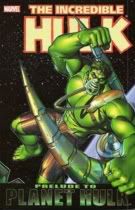 The Incredible Hulk: Prelude to Planet Hulk
The Incredible Hulk: Prelude to Planet HulkBy Daniel Way, Keu Cha, and Juan Santacruz
Published by Marvel; $13.99 US
Collects Incredible Hulk #88-#91 and Official Handbook of the Marvel Universe: Hulk 2004
So, "Planet Hulk" has got the entire greenskin-lovin’ world feeling like they managed to locate that remote control from Click and found out where Power Girl likes to jog. Words like "best," "since," "Peter," and "David" litter not only the fan message boards but just about every other review. He may not be getting Civil War numbers, but it’s obvious Hulk’s making the kind of splash the book hasn’t made in a while.
As a regular browser and poster on a few Hulkilicious message boards here and there, I’ve seen a lot of unfamiliar "faces" on the green forums in the past few months. And a lot of them tend to ask what there is before "Planet Hulk" that they should read. So, I thought I’d take a look at the story of how Hulk got lured into the last frontier in the first place.
The story: Bruce Banner seeks solace in the Alaskan wilderness. Nick Fury finds him and enlists the reluctant scientist to use his greener side to dispose of a decades-old Hydra satellite with the capability of detonating every nuke on Earth. As soon as Hulk locks horns with the sentient machine, he finds out Fury hasn’t been completely honest with him, but he doesn’t know the half of it yet.
The name of this arc, when originally released, was "Peace In Our Time." In fact, before Marvel officially announced the creative team of Way and Cha, the trade was listed as Incredible Hulk: Peace In Our Time at Amazon. While the decision to change the sub-title to Prelude to Planet Hulk likely had more to do with the buzz "Planet Hulk" was getting than any kind of admission of guilt, it still reflected an unintentional and surprising bit of critical honesty on Marvel’s part.
In other words, Prelude to Planet Hulk is perfectly named. It’s a prelude to something else, and that’s all it is. It’s a story that could easily have been squeezed into one or two issues, and it leaves the reader feeling that the editorial direction Way received amounted to little more than "Please fill space." The only noteworthy thing about it is that at the end the Hulk gets kicked out of the classroom, Major-Tom-Style.
Way has leaned towards so-called "decompressed" storytelling in the past, and in some cases it’s worked well. Unfortunately, Prelude isn’t the right story for this particular style. In series like Venom and Sabretooth, which both featured predator-and-prey stories with strong sci-fi thriller flavor, the pacing helped to build suspense. In Prelude, Way keeps the same pace but the suspense just isn’t there. Much like Bruce Jones's first issue of Hulk, the first chapter of Prelude does nothing but let us know Banner has isolated himself from society, while giving us a brief tussle between Hulk and some unimpressive thugs. The art from both Cha and Santacruz seems stiff and ill-suited to action sequences.
There really isn't much left to say. It's boring and slow and really not worth your money. The trade also collects Official Handbook of the Marvel Universe: Hulk 2004, and I've never enjoyed handbooks, so I didn't even bother to read it. I am intending on picking up the Planet Hulk Gladiator Guidebook, though that does seem to do something the other handbooks don't. It offers info that you couldn't get otherwise and that isn't essential to understanding the story, while most of Marvel's guidebooks just compile info that any reader could know had they read the issues. No disrespect meant to the folks who put the handbook together, it's just not my cup o' tea.
Labels:
Graphic Novel/Comic Book Reviews,
Hulk
Go US Mail System! Go!
Well, the resurrection of Superheroes, etc. goes relatively slow, mainly because, well, heh, I have the shingles.
That's right. I am suffering from a medical condition that makes me sound like I should have roofers working on me. I looked it up on Wikipedia, hoping that I could find a more technical term, because "shingles" just sounds so damn dirty, and guess what the medical term is? Herpes zoster. HERPES zoster. Much better. It sounds like something you catch from having sex with a priest (and I could've sworn Father O'Reilly was using protection).
From what I've read and heard, I don't have it so bad. My mother said my grandfather caught it once, that he had a rash under his belly, and that it was so bad that it looked like someone tied a rope around his waist.
I've got a few blisters behind my ear and behind my neck, thankfully hidden under my hair. For the past few days I've suffered from a good deal of throbbing pain, not excruciating but too annoying to concentrate on reading and writing. I'm still working, but it's been tough. I've got some anti-virals and pain meds, and I'm already feeling a little better.
My girlfriend is going away for the weekend and I'll have a few days off work, so I'm hoping to do nothing but eat, sleep, read, and relieve myself (emphasis on sleep) until Monday. Since I've watched every damn DVD in my apartment, I'm hoping the mail system will work a little faster than normal. I made a couple of trades at Sequential Swap, and I'm hoping the books reach me by the weekend so I have something to pass the time. In total, I've got 9 books on their way from two different swappers:
Captain America: Winter Soldier, Vol. 1
Conan, Vol. 2: The God in the Bowl & Other Stories
Hulk/Wolverine: Six Hours
Justice League: A New Beginning
Planet of the Capes
Quantum & Woody: The Director's Cut (the trades of Q&W have proven damn hard to track down, in fact I almost hope I don't like it too much, because otherwise I'll want to track down the other three)
Twisted Toyfare Theatre, Vol. 4
Twisted Toyfare Theatre, Vol. 6
Young Gods and Friends
If I don't get them, and I'm feeling well enough, I may begin the first major project I want to do for the blog: reviewing every single volume of Lone Wolf and Cub.
That's right. I am suffering from a medical condition that makes me sound like I should have roofers working on me. I looked it up on Wikipedia, hoping that I could find a more technical term, because "shingles" just sounds so damn dirty, and guess what the medical term is? Herpes zoster. HERPES zoster. Much better. It sounds like something you catch from having sex with a priest (and I could've sworn Father O'Reilly was using protection).
From what I've read and heard, I don't have it so bad. My mother said my grandfather caught it once, that he had a rash under his belly, and that it was so bad that it looked like someone tied a rope around his waist.
I've got a few blisters behind my ear and behind my neck, thankfully hidden under my hair. For the past few days I've suffered from a good deal of throbbing pain, not excruciating but too annoying to concentrate on reading and writing. I'm still working, but it's been tough. I've got some anti-virals and pain meds, and I'm already feeling a little better.
My girlfriend is going away for the weekend and I'll have a few days off work, so I'm hoping to do nothing but eat, sleep, read, and relieve myself (emphasis on sleep) until Monday. Since I've watched every damn DVD in my apartment, I'm hoping the mail system will work a little faster than normal. I made a couple of trades at Sequential Swap, and I'm hoping the books reach me by the weekend so I have something to pass the time. In total, I've got 9 books on their way from two different swappers:
Captain America: Winter Soldier, Vol. 1
Conan, Vol. 2: The God in the Bowl & Other Stories
Hulk/Wolverine: Six Hours
Justice League: A New Beginning
Planet of the Capes
Quantum & Woody: The Director's Cut (the trades of Q&W have proven damn hard to track down, in fact I almost hope I don't like it too much, because otherwise I'll want to track down the other three)
Twisted Toyfare Theatre, Vol. 4
Twisted Toyfare Theatre, Vol. 6
Young Gods and Friends
If I don't get them, and I'm feeling well enough, I may begin the first major project I want to do for the blog: reviewing every single volume of Lone Wolf and Cub.
Friday, July 07, 2006
Review - The Incredible Hulk #96
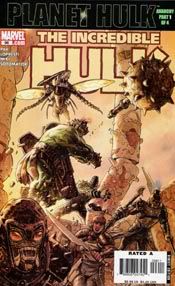 The Incredible Hulk #96
The Incredible Hulk #96By Greg Pak and Aaron Lopresti
Published by Marvel; $2.99 US
The first installment of "Planet Hulk: Anarchy" brings with it the opening shots of the military conflict between the Red King’s forces and those of Hulk and his warbound gladiators, a revelation about Miek’s past, and new penciler Aaron Lopresti.
Right up front I’ve got to give props to Lopresti for maintaining a stylistic unity between his work and Pagulayan’s (who, unless I’m mistaken, will be returning for the third arc). There are visible differences, obviously. For example, the Hulk looks just a little less rugged than he did during "Exile." But for the most part Lopresti has given us a seamless transition, something I imagine could give a kick to the ego for someone working in any kind of visual medium.
The supporting cast takes the starring role in "Anarchy, Part 1." Hulk, in fact, only has about a half-dozen lines of dialogue. Though his presence is still felt and we do get some cool Hulk-smashage. Miek, in particular, takes center stage as he leads the warbound gladiators to the land where he was born (hatched?). Hiroim takes on a more prominent role as the strategic adviser of the group, and the Brood Sister is becoming one of my favorite of Hulk’s allies. Pak makes her both surprisingly empathic and utterly creepy.
I’m not going to get into the particulars of Miek’s story, because Pak handles it so well I feel like relating even the basic, non-spoiler facts could take away from a reader’s enjoyment. Suffice to say, Miek’s past leads to a conflict, and Pak fools you into thinking he’s going to give it your average "shiny happy people" Hollywood ending. Then he pulls the rug out from under you and shows why this chapter of "Planet Hulk" is called "Anarchy."
Finally, kudos for the hilarious letters page that features the Red King answering reader questions, and also what may or may not have been another light-hearted jab at Hulk’s Ultimate counterpart (hint: It’s on the first page and it has to do with Hulk’s diet).
Labels:
Graphic Novel/Comic Book Reviews,
Hulk
Here comes the love
If there’s blame to be assigned for my return to this cobwebbed blog, lay it on Kazuo Koike and Goseki Kojima. I had resigned myself to forgetting Superheroes, etc. I started a new Hulk fan blog called Green Days to satiate my need to run my mouth (so to speak) on comics that wouldn’t bite too deeply into my hectic schedule. Then, after Lone Star Comics threw some credit my way for selling them back issues, I got my hands on the last four volumes of Lone Wolf and Cub and read them all the night they arrived.
I cried. I cried like a big, fat Daigoro with my shoulders on the counter in front of me, and my face buried in my palms. Something happened to me at the end of the series that’s never happened while reading a comic book, a novel, anything.
Hopefully, this won't give too much away: In the final scene, Daigoro listens to his father’s words about life, death, rebirth, and how they relate to the ocean.
And I heard the ocean. I heard it. I didn’t intellectually appreciate the artist’s depiction of the ocean or feel particularly struck by Itto’s metaphor. I just fucking heard it. Not in my head. In my ears (well, I guess they’re part of my head). In stereo. I heard the ocean. I literally heard the waves roll up the shore, lick at Daigoro’s toes, and trickle back. I heard it. To Hell with seashells, I’ve got the final volume of Lone Wolf and Cub.
Then I read the third volume of Runaways. It was okay. Lots of snark. Cool art.
The next day, I thought about my growing collection of trades, hardcovers, OGNs, and anthologies. I thought about how I’d spent close to $300 on Lone Wolf and Cub, how little I regretted losing a dime of that money, how much I looked forward to cracking open the books again, maybe even sharing the stories with my children (they don’t exist yet, of course) once I felt they were old enough for the kind of material inside (Runaways, obviously, would be a safer bet), and finally how much I DID NOT feel the same about my collections of Runaways, Young Avengers, Sabretooth, X-men, Bullseye, WildC.A.T.S., House of M, Young Justice, etc.
It struck me how much I deserved to expect nothing less than stories that were, in some way, extraordinary. Not good. Not okay. Not super-cool or killer. Extraordinary. I felt a simultaneous hunger for stories that could affect me as much as Lone Wolf and Cub, and a complete apathy for series - like those named above - that I’d bought only from a need to gather more ongoing super-soap-operas in which to become engrossed. Not that all, or most, or any of the above-named series were bad, but I didn’t just want "not bad." I felt a strong need for books that genuinely do some of the things art, in any form, is supposed to do: to entertain, to change life, and to maybe even alter the audience’s view of the world. I wanted more of what I felt after reading Watchmen, Moore’s Swamp Thing, WE3, Barefoot Gen, and the Astro City trade that brought me back to comics after a long break.
So I took all the super-soap-opera trades mentioned earlier, and more, and stuck them all on my swap list at Sequential Swap, hoping to barter for some more books that might alter my reality. And then I went out and bought some.
I bought three trades at my local comic shop on Wednesday, and I’ve never had a better comic book buying day. I’ve never bought multiple trades in one day and been so absolutely impressed with all three. I picked up the second book of Bluesman, the first 15-issue collection of Matt Wagner’s Mage (the trade, not the HC, I didn’t become rich since last I updated the blog), and Fantastic Four/Iron Man: Big in Japan. Again, I read them all that night.
And I wanted so bad to FUCKING TALK TO SOMEONE ABOUT IT!!!!!!!!
But I couldn’t. The friends I talk to on a daily basis are limited in their comic book knowledge, and usually their body language reveals their lack of interest when I start going on about Lone Wolf and Cub or Starman. The guy who works the shift before me is occasionally willing to talk to me about new or upcoming superhero movies. That’s about it.
So, expect more reviews. I still feel ill-equipped to review non-superhero stuff like Bluesman and Lone Wolf and Cub, but I’m going to give it my best shot because the prostitutes, drunk fratboys, and bikers choking the bars around my radio station tend to be disinterested in my thoughts on classic manga and Harvey Pekar.
I cried. I cried like a big, fat Daigoro with my shoulders on the counter in front of me, and my face buried in my palms. Something happened to me at the end of the series that’s never happened while reading a comic book, a novel, anything.
Hopefully, this won't give too much away: In the final scene, Daigoro listens to his father’s words about life, death, rebirth, and how they relate to the ocean.
And I heard the ocean. I heard it. I didn’t intellectually appreciate the artist’s depiction of the ocean or feel particularly struck by Itto’s metaphor. I just fucking heard it. Not in my head. In my ears (well, I guess they’re part of my head). In stereo. I heard the ocean. I literally heard the waves roll up the shore, lick at Daigoro’s toes, and trickle back. I heard it. To Hell with seashells, I’ve got the final volume of Lone Wolf and Cub.
Then I read the third volume of Runaways. It was okay. Lots of snark. Cool art.
The next day, I thought about my growing collection of trades, hardcovers, OGNs, and anthologies. I thought about how I’d spent close to $300 on Lone Wolf and Cub, how little I regretted losing a dime of that money, how much I looked forward to cracking open the books again, maybe even sharing the stories with my children (they don’t exist yet, of course) once I felt they were old enough for the kind of material inside (Runaways, obviously, would be a safer bet), and finally how much I DID NOT feel the same about my collections of Runaways, Young Avengers, Sabretooth, X-men, Bullseye, WildC.A.T.S., House of M, Young Justice, etc.
It struck me how much I deserved to expect nothing less than stories that were, in some way, extraordinary. Not good. Not okay. Not super-cool or killer. Extraordinary. I felt a simultaneous hunger for stories that could affect me as much as Lone Wolf and Cub, and a complete apathy for series - like those named above - that I’d bought only from a need to gather more ongoing super-soap-operas in which to become engrossed. Not that all, or most, or any of the above-named series were bad, but I didn’t just want "not bad." I felt a strong need for books that genuinely do some of the things art, in any form, is supposed to do: to entertain, to change life, and to maybe even alter the audience’s view of the world. I wanted more of what I felt after reading Watchmen, Moore’s Swamp Thing, WE3, Barefoot Gen, and the Astro City trade that brought me back to comics after a long break.
So I took all the super-soap-opera trades mentioned earlier, and more, and stuck them all on my swap list at Sequential Swap, hoping to barter for some more books that might alter my reality. And then I went out and bought some.
I bought three trades at my local comic shop on Wednesday, and I’ve never had a better comic book buying day. I’ve never bought multiple trades in one day and been so absolutely impressed with all three. I picked up the second book of Bluesman, the first 15-issue collection of Matt Wagner’s Mage (the trade, not the HC, I didn’t become rich since last I updated the blog), and Fantastic Four/Iron Man: Big in Japan. Again, I read them all that night.
And I wanted so bad to FUCKING TALK TO SOMEONE ABOUT IT!!!!!!!!
But I couldn’t. The friends I talk to on a daily basis are limited in their comic book knowledge, and usually their body language reveals their lack of interest when I start going on about Lone Wolf and Cub or Starman. The guy who works the shift before me is occasionally willing to talk to me about new or upcoming superhero movies. That’s about it.
So, expect more reviews. I still feel ill-equipped to review non-superhero stuff like Bluesman and Lone Wolf and Cub, but I’m going to give it my best shot because the prostitutes, drunk fratboys, and bikers choking the bars around my radio station tend to be disinterested in my thoughts on classic manga and Harvey Pekar.
Thursday, June 22, 2006
Review - Giant-Size Hulk #1
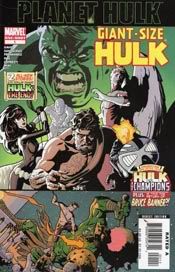 Giant-Size Hulk #1
Giant-Size Hulk #1By Peter David, Greg Pak, Juan Santacruz, Aaron Lopresti, and Dale Keown
Published by Marvel; $4.99 US
The last time we got a single Hulk issue this size was back in 2001 with the "Monster-sized" Incredible Hulk #33, which featured an original fill-in by Christopher Priest and some reprints from both the heyday of Len Wein and the dawn of Peter David’s first Hulk run. The reprints were cool and Priest’s story was funny and touching, but the stories didn’t really have anything to do with where the character was going or any strong connection with each other. In comparison, Giant-Size Hulk #1 gives us “Green Pieces,” a Hulk vs. Champions story that, if the solicitations are trustworthy, holds some connection to a post-Planet-Hulk event; "Banner War," a "Planet Hulk" interlude that answers the question of why the Hulk’s paler half has been absent from Sakaar; brief interviews with Greg Pak and Anthony Flamini (writer of the upcoming Planet Hulk Gladiator Guidebook); and a beautiful reprint of Incredible Hulk: The End, the first of Marvel’s "The End" books that premiered in 2002 and reunited Peter David and Dale Keown on a Hulk book for the first time since 1996’s Hulk/Pitt, and whose climax has an interesting connection with Pak’s "Banner War."
The clash between the Hulk and the Champions (perhaps the most awkwardly cast super-hero team in history, and this is coming from a hardcore Defenders fan) comes first and is set hard on the heels of the battle royal featured in 1977’s Champions #16. With the exception of David’s trademark quips, it channels the classic Hulk-fights-someone-who-thinks-he’s-a-bastard-and-feels-bad-about-it-later stories of the 70’s, and that’s a good thing. For an 18-pager, we get a respectable tussle between greenskin and the Champions, as well as a surprise guest appearance.
Maybe it’s because I’ve read so much of David’s stuff that the humor has grown stale, but a lot of the funny just doesn’t work for me. The set-ups to jokes seem a little self-conscious, but I did get a nice chuckle out of Hercules’s commentary on the screwy time-logic of the Marvel Universe.
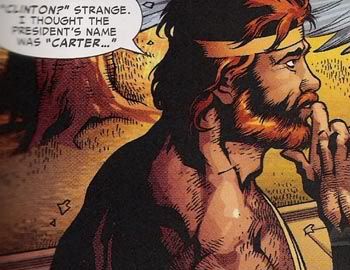
The solicit for Giant-Size Hulk promised that "Green Pieces" would hold "a key to Post-PLANET HULK events!" What’s the key? No clue. Probably the clearest possibility has something to do with Hercules’s regret at the end of the story. Since Herc’s in the anti-registration camp of Civil War, at least a good chunk of the Illuminati members are on the opposite side, and if/when Hulk returns to Earth looking for payback he may be gunning for the Illuminati, maybe the "key" has something to do with a post-Civil-War alliance? Another possibility has to do with the aforementioned surprise guest, but there’s less of an obvious connection there.
Initially I had one minor quibble about Hercules’s lamentation. I wondered if this chipped out a bit of continuity in regards to later meetings between Hercules and Hulk, particularly in reference to Byrne’s and Milgrom’s Hulk/Bi-Coastal Avengers battles when Hercules seemed so excited at the chance of another knuckle-bruising with the Hulkster, as well as David’s Incredible Hulk - Hercules Unleashed in which the demigod was suspicious of the green goliath’s connection with the Avengers’ "deaths" and was hellbent on either recruiting or pounding on him. I thought about it though, and in the end I don’t think there’s any discrepancy there. I think it’s absolutely believable to assume that Herc’s passion for fisticuffs overpowered his memory, just as it tends to overpower what little common sense and decorum he possesses.
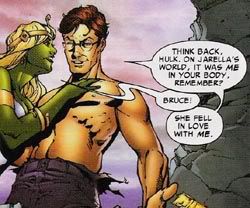
Over the years Hulk has given us a lot of dreamy sequences in which Banner and Hulk meet to hash things out either literally in dreams or on some kind of hypnosis-induced mental plane. Pak’s "Banner War" is a surprisingly original chapter in this ongoing conflict for one simple reason: Banner ain’t the victim this time around.
In most stories like this, we either see Banner imagining himself in physical conflict with – or simply being chased down by – the Hulk, or – as was the case in David’s first run and Jenkins’s as well – the various personalities rolling around Banner’s head are on a more level playing field. "Banner War" turns the paradigm on its head, portraying Banner as an emotional tyrant trying to belittle the Hulk into submission. Banner is at his most irrational, saying things like, "Let me take over. I’ll find the ship. I’ll fix it. We’ll go to the planet Reed wanted us to go to." Apparently, Banner forgets that there’s an army between him and the spaceship; an army even the Hulk might have a hard time plowing through. It's Banner, and not Hulk, who viciously rips at his alter-ego's insecurities in order to prove he's the dominant persona.

One of the most enjoyable parts of the story is Hulk imagining his vengeance on Earth’s heroes. There’s some great dialogue, including some digs at recent Hulk appearances in books like Ultimate Wolverine vs. Hulk, Sentry, and even, during a dreamed return to Jarella’s World, Pak’s own story ("Look at you living these old stories again…This is embarrassing.").
"Banner War" should prove, for anyone who’s been wondering, that Pak has the chops not only to bring the action back to Incredible Hulk, but give us some new spins on the Banner/Hulk relationship. I’m more convinced than ever that I’d like to see Pak continue after "Planet Hulk" closes its doors.
Considering Hulk, and not Banner, is on the cover of future "Planet Hulk" additions, it shouldn’t be too tough to figure out who wins the conflict. Whether it was coincidence or not, the end of "Banner War" echoes the events of the third piece in Giant-Size Hulk: a reprint of Peter David and Dale Keown’s Incredible Hulk: The End.
"The Last Titan" was originally published as a short story in the 1998 prose collection, The Ultimate Hulk. David and Keown adapted it for comics for the first of Marvel’s "The End" books, and the issue has since become notoriously difficult to find in back-issue bins or auction sites. Incredible Hulk: The End shows us a world in which Bruce Banner is literally the last human on Earth. Humanity and its heroes have been wiped out by a nuclear holocaust, leaving Banner to wander aimlessly across the Americas, with only a ravenous horde of evolved cockroaches and an alien vidbot to keep him company. Keown’s art is beautiful, and comparing it to his early work on Hulk reveals a wonderful evolution in his craft (that, unfortunately, helped to make his last work on the character, Darkness/Hulk, so disappointing).
The war between Banner and Hulk has never been more vicious, and the end result is sad, chilling, and David portrays it so perfectly that you end up asking yourself how it could ever have ended any other way. The story of how the nuclear holocaust takes place - terrorist attacks followed by US retaliation - is particularly eerie when you remember Incredible Hulk: The End was originally released not too long after 9/11. In fact the double-page spread that chronicles the event features a picture of Hulk standing atop a pile of rubble that was altered for Marvel's post-9/11 Heroes collection to show Hulk holding an American flag.
My only problem with the story is Banner’s revelation regarding the connection between himself and the mythic figure Prometheus. The Hulk-Prometheus link is indicative of David’s tireless dedication and ingenuity towards constantly re-defining a character he’d handled for over a decade, but the way it’s presented feels a bit like spoon-feeding and even a little too academic. David has never been sneaky or subtle about his metaphors, and this one is brilliant. I guess that’s the problem. It’s not just brilliant in the sense that it’s smart, but brilliant in the sense that it’s glaring. Still, despite its faults, "The Last Titan" is touching and one of the better Hulk tales of the last half-dozen years or so.
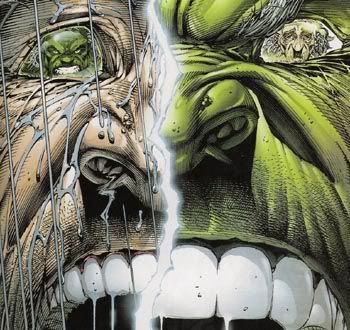
Overall, Giant-Size Hulk #1 is one of the most satisfying Hulk reads I’ve bought in a while. I feel more thoroughly Hulk-satiated with GSH than with any of the recently-released Hulk trades. At $4.99, it’s a steal. It’s honest-to-Zeus weird to feel so optimistic about the future of Hulk that I’m actually worrying about whether or not the creative team can keep up the pace and the quality. Civil War might not be keeping die-hard
Labels:
Graphic Novel/Comic Book Reviews,
Hulk
Thursday, June 15, 2006
Opinion- My problem with the Ultimate Hulk
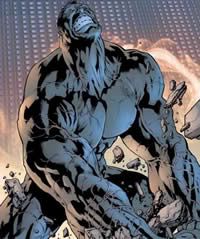 If you were to construct a list of the most volatile subjects among Hulk fans, the Ultimate line’s re-interpretation of the Hulk would be right up there with Bruce Jones’s run and Joe Casey’s snake. Hulk was first Ultimatized in Ultimate Marvel Team-Up #2-#3. The Ultimate Hulk wouldn’t show up again until Mark Millar and Bryan Hitch’s Ultimates, with Bruce Banner as second-in-command of the US government’s program to produce a super-hero team. Specifically, Banner’s job was to reproduce the super-soldier formula that created Captain America. Eventually, Captain America was found alive and frozen in a block of ice. With Banner’s job presumably made redundant because of this discovery, Betty Ross separated from him and dating movie stars, Hank Pym in Banner’s former leadership position, and people like Wasp and Tony Stark doing everything they can to antagonize him, Banner finds himself at the end of his rope. He had been cured of the Hulk after his initial transformation in Ultimate Marvel Team-Up, but purposely injects himself with a mixture of the old Hulk serum and Captain America’s blood in Ultimates to become the Hulk once more. As it was in the MU proper with the Avengers, the Ultimates’s first action is taken to control the Hulk, and Thor joins the team as a result. The Hulk who rampages through the Ultimate world’s Manhattan ain’t the misunderstood, good-hearted beast many Hulk fans have grown up with. The crimes committed by the Ultimate Hulk include mass murder, cannibalism, and (arguably, considering a scene from the previews of Ultimate Wolverine vs. Hulk) rape.
If you were to construct a list of the most volatile subjects among Hulk fans, the Ultimate line’s re-interpretation of the Hulk would be right up there with Bruce Jones’s run and Joe Casey’s snake. Hulk was first Ultimatized in Ultimate Marvel Team-Up #2-#3. The Ultimate Hulk wouldn’t show up again until Mark Millar and Bryan Hitch’s Ultimates, with Bruce Banner as second-in-command of the US government’s program to produce a super-hero team. Specifically, Banner’s job was to reproduce the super-soldier formula that created Captain America. Eventually, Captain America was found alive and frozen in a block of ice. With Banner’s job presumably made redundant because of this discovery, Betty Ross separated from him and dating movie stars, Hank Pym in Banner’s former leadership position, and people like Wasp and Tony Stark doing everything they can to antagonize him, Banner finds himself at the end of his rope. He had been cured of the Hulk after his initial transformation in Ultimate Marvel Team-Up, but purposely injects himself with a mixture of the old Hulk serum and Captain America’s blood in Ultimates to become the Hulk once more. As it was in the MU proper with the Avengers, the Ultimates’s first action is taken to control the Hulk, and Thor joins the team as a result. The Hulk who rampages through the Ultimate world’s Manhattan ain’t the misunderstood, good-hearted beast many Hulk fans have grown up with. The crimes committed by the Ultimate Hulk include mass murder, cannibalism, and (arguably, considering a scene from the previews of Ultimate Wolverine vs. Hulk) rape. The only thing that threatens to make Banner more sympathetic than his alter-ego is that he can’t eat the people who abuse him. He’s thoroughly pissed on by most of the Ultimates even before he tears through Manhattan, but in the end you get the sense that he deserves it. The Ultimate Bruce Banner is insecure, self-involved, insulting, and expresses concern only for himself after his rampages.
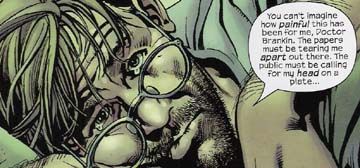
I’ve read a lot of debates about this subject on the Net, and the guys who like the Ultimate Hulk tend to say a lot of the same things. A lot of readers feel that this interpretation is a more genuine one. There’s a sense that people feel the more puritanical sensibilities of super-hero comics are what made the Hulk anything close to a hero, and that Millar’s drunken nurse-eater is a more real examination of the dark side of humanity. I think there’s some validity there. Reading the early issues of Hulk, the character seemed like an uncomfortable mix between the old Marvel Monsters and new super-heroes of the time, which may in part explain why the original series only lasted six issues.
Another point the fans of Ultimate Hulk tend to bring up, and rightly so, is that if you don’t like it, you don’t have to buy it. Fans who can’t handle the idea of Millar and Co.’s reinterpretation of their favorite character don’t have to handle it. They can completely ignore the Ultimate universe.
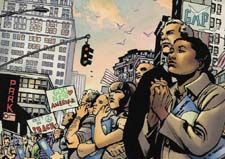 I have two problems with these arguments. First, while the Ultimate line’s less strict view of morality doesn’t limit the kind of Hulk stories that can be told, it does limit the kind of stories that can be told with the Hulk as a hero. Maybe I’m wrong, but I don’t think you can sell a mass-murder/rapist/cannibal as a sympathetic comic book protagonist. As soon as the smoke cleared in Manhattan after the Hulk’s rampage, and the artwork went as far as it could to make it look like NYC during the aftermath of 9/11, any hope of the Ultimate Hulk ever being portrayed as anything close to a super-hero was destroyed.
I have two problems with these arguments. First, while the Ultimate line’s less strict view of morality doesn’t limit the kind of Hulk stories that can be told, it does limit the kind of stories that can be told with the Hulk as a hero. Maybe I’m wrong, but I don’t think you can sell a mass-murder/rapist/cannibal as a sympathetic comic book protagonist. As soon as the smoke cleared in Manhattan after the Hulk’s rampage, and the artwork went as far as it could to make it look like NYC during the aftermath of 9/11, any hope of the Ultimate Hulk ever being portrayed as anything close to a super-hero was destroyed. And maybe that’s okay. Maybe it’s okay for Ultimate Hulk to be a villain. It doesn’t affect the regular MU Hulk, does it?
Or does it?
And that’s my second problem. Spillage. Whenever we get an alternate interpretation of an established character, and that interpretation is met with the kind of success Ultimates has enjoyed, the Powers That Be tend to bring the originals closer to the alternates. Every time Joe Quesada talks about the possibility of splitting up Peter Parker and Mary Jane, he almost always mentions the success of Ultimate Spider-Man. While I haven’t read Captain America in a while, the original's costume was re-designed after the success of Ultimates to make it look more like the WW II era Cap of Ultimate Marvel. The regular MU Nick Fury has certainly started to borrow the Ultimate Fury's more manipulative aspects. Simply the idea of killing villains is becoming more acceptable in the MU proper, while the morality of it never seems to even be questioned in the Ultimate line. I wouldn't doubt that when Thor returns to the regular MU, he'll be re-worked to resemble the Ultimate version in certain ways.
We're already seeing the debris of the Ultimate Hulk affect the original. With New Avengers: Illuminati, the idea that the Hulk has killed large numbers of people during his rampages was made fact, and helped to inform the decision to exile him to outer space. If the less-than-subtle hints about a post-Civil-War "Hulk vs. Everybody" event sees fruition, it's likely this will be brought up again. I wouldn't doubt we'll see, considering the trend in Marvel and DC towards casual slaughter of super-heroes, Hulk killing a few masks here and there.
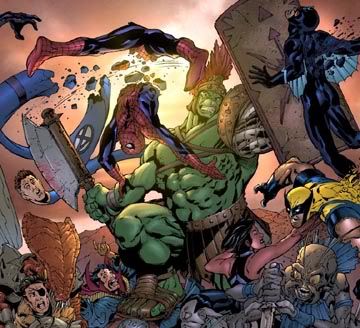
I doubt we'll ever see a Hulk in the MU proper who eats people, but I am concerned with what the point of all this is. Judging by Bendis's reactions to Hulk fans' complaints about New Avengers: Illuminati, the only point I can see is that in real life, people would die because of the Hulk's rampages. Okay, maybe, but as Dan Slott pointed out, what super-hero heavyweight wouldn't have a similar death count on his/her conscience? Hell, forget the heavyweights. Spider-Man can lift trucks. How many times has this guy fought non-powered muggers, mafia hoods, would-be rapists, etc.? How could a guy with that much physical power hold back enough to not kill every single non-powered man or woman he's ever struck? We tend to think of Spidey as a lightweight because we've got the heavies like Hulk, Thing, and Thor to compare him to, but I have a tough time believing that, in real life, if I had the physical strength to lift a truck over my head that I could do so much as punch a man in the face without pushing his nose through the back of his skull.
The point being that when you start writing super-heroes in certain ways just because that's what they would be like "in real life," you're starting down a slippery slope. There's nowhere else to go because super-heroes do not, and cannot, exist in real life, which, duh, is probably one of the reasons we like to follow their adventures. Once everything starts revolving around what these impossible characters would be like in a possible world, you whittle away everything that makes super-heroes "super." What you end up with may very well be an intriguing story, but if you're writing ongoing characters set in a broad mythology like the Marvel Universe, then the result is going to be the death of the franchise. You can't just brush off the Hulk becoming a mass murderer. It's one thing to have Wolverine or Punisher carve up hordes of ninjas, it's another to have a household name killing more innocent civilians than Osama Bin Laden or the Hiroshima nuke.
The Hulk has rarely been a bonafide super-hero in the rigid definition of a character who consciously fights for what h/she believes to be justice. He’s fought villains and saved the world, but in many cases he’s done “what’s right” because what was right coincided with his goals of freeing himself from the various villains, heroes, and government agencies who hounded him. It was only during the various periods that Banner won some mental control over the Hulk’s body that he purposely fought villains for purely altruistic reasons. The Hulk’s heroism is much more personal, in that it lies in his determination to never be made prisoner or servant to anyone else.
For better or worse, Millar’s Hulk has been stripped of any chance to be a hero in any sense. He’s more like Hannibal Lecter than the Hulk of the MU proper. He’s less personable and more destructive even than the Mr. Hyde of The League of Extraordinary Gentlemen, and, if it’s possible, more sexually horrific. Unless Marvel decides to put on some Jemas-like continuity blinders to the "revelations" of New Avengers: Illuminati, I worry that the success of Millar's Ultimate Hulk is going to continue pulling the original down the same path.
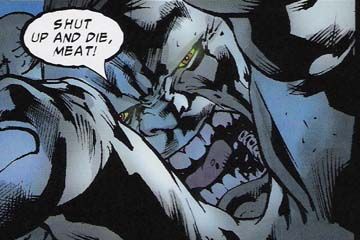
Labels:
Hulk
Subscribe to:
Posts (Atom)
